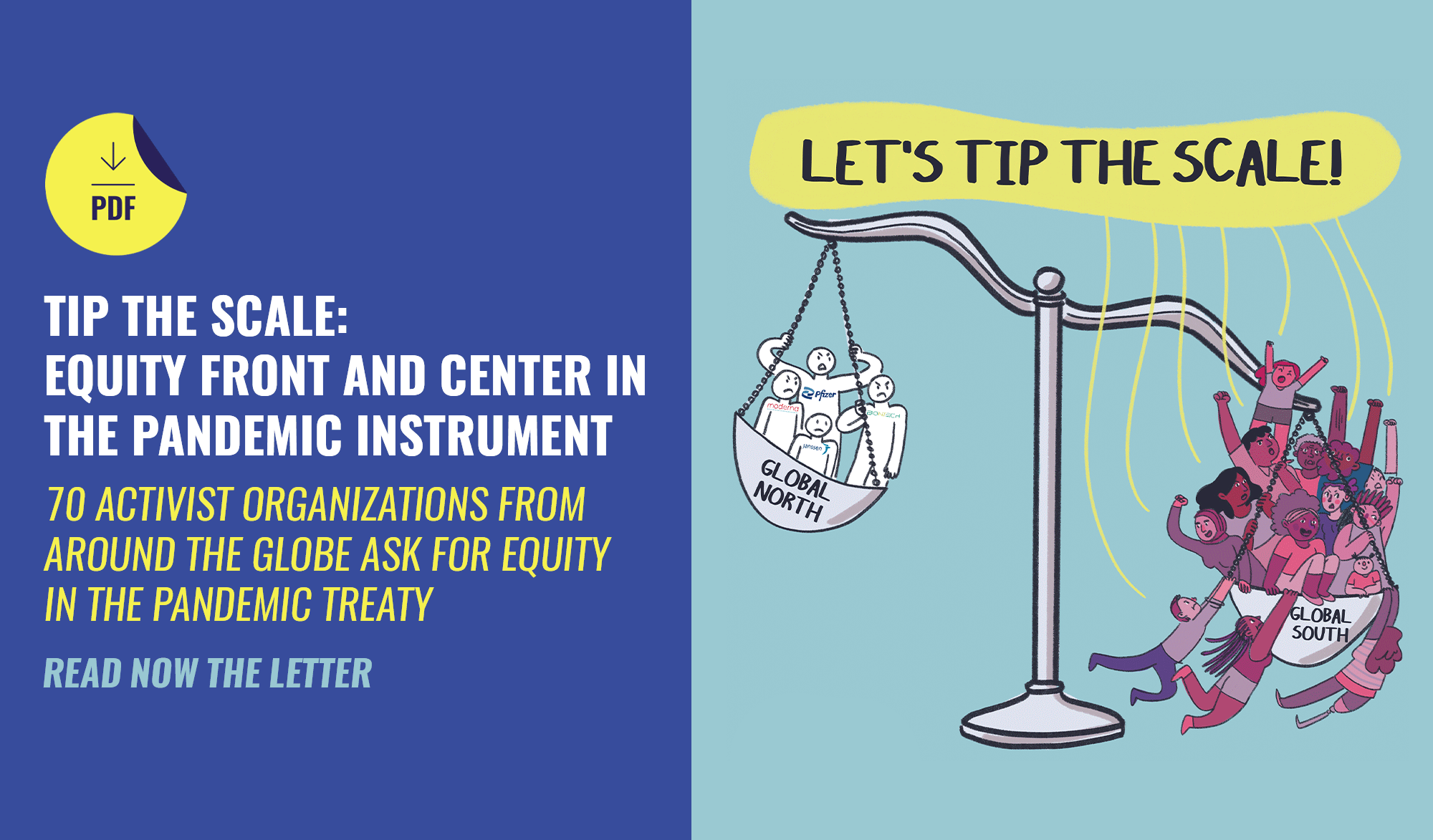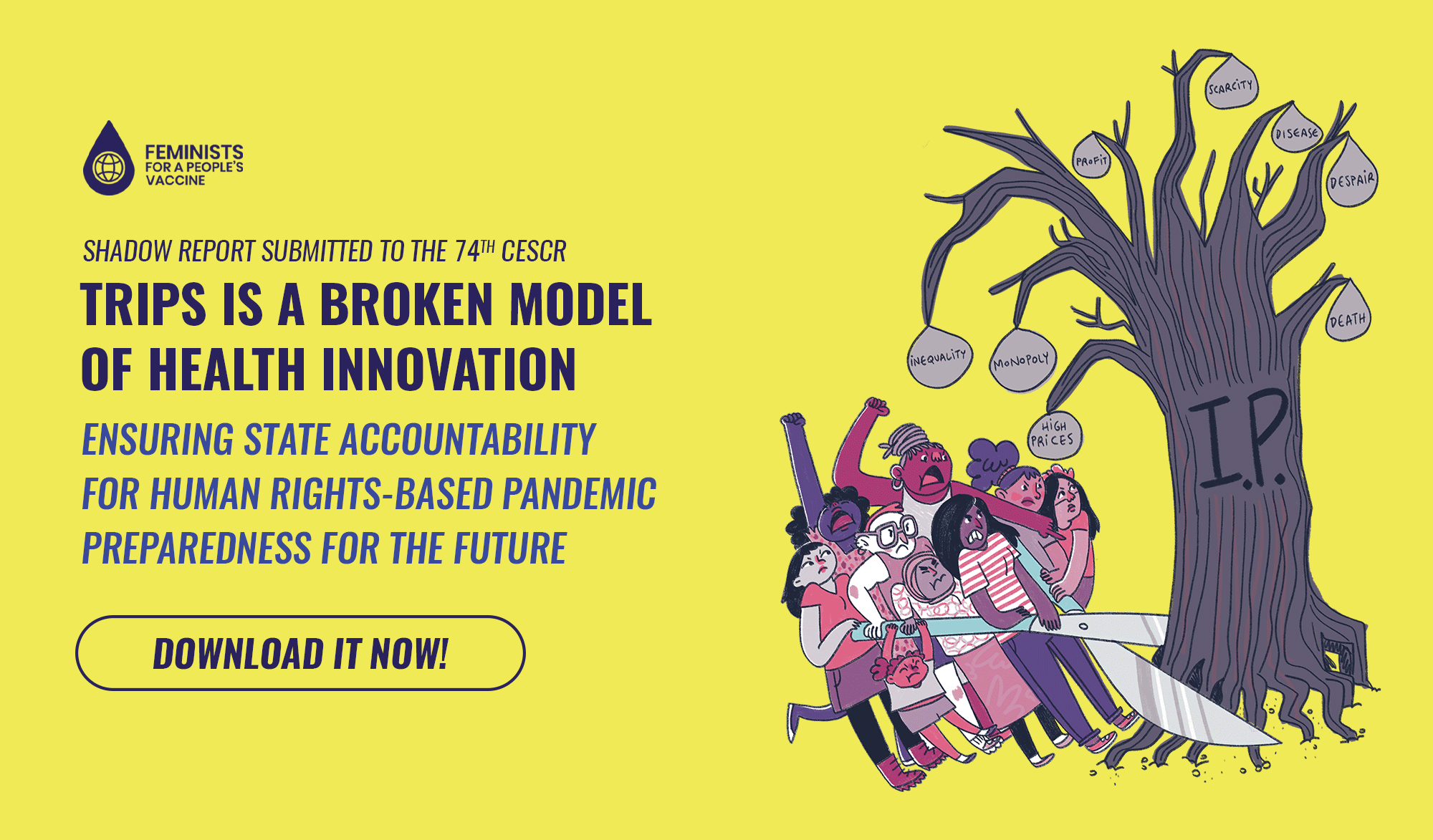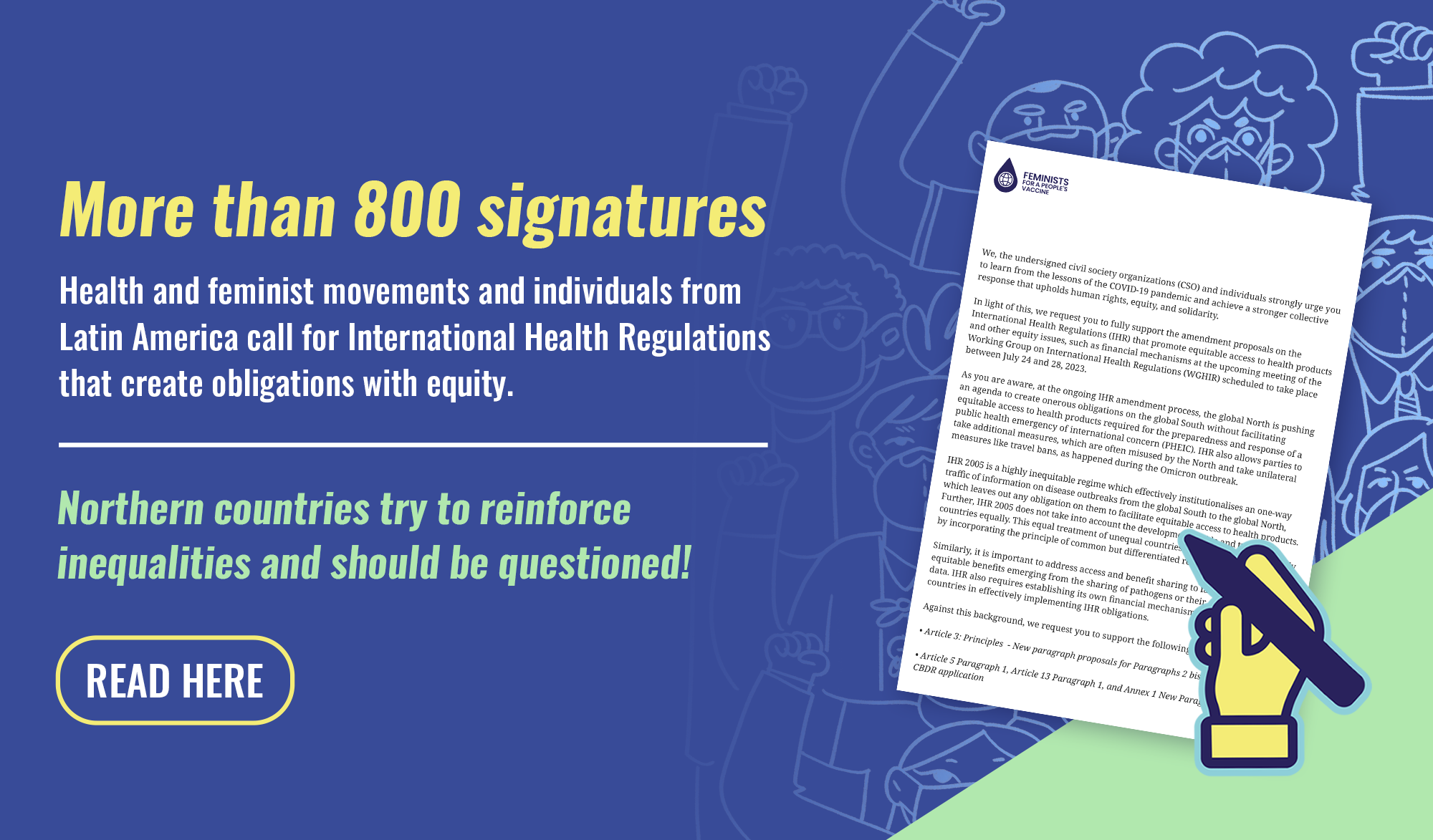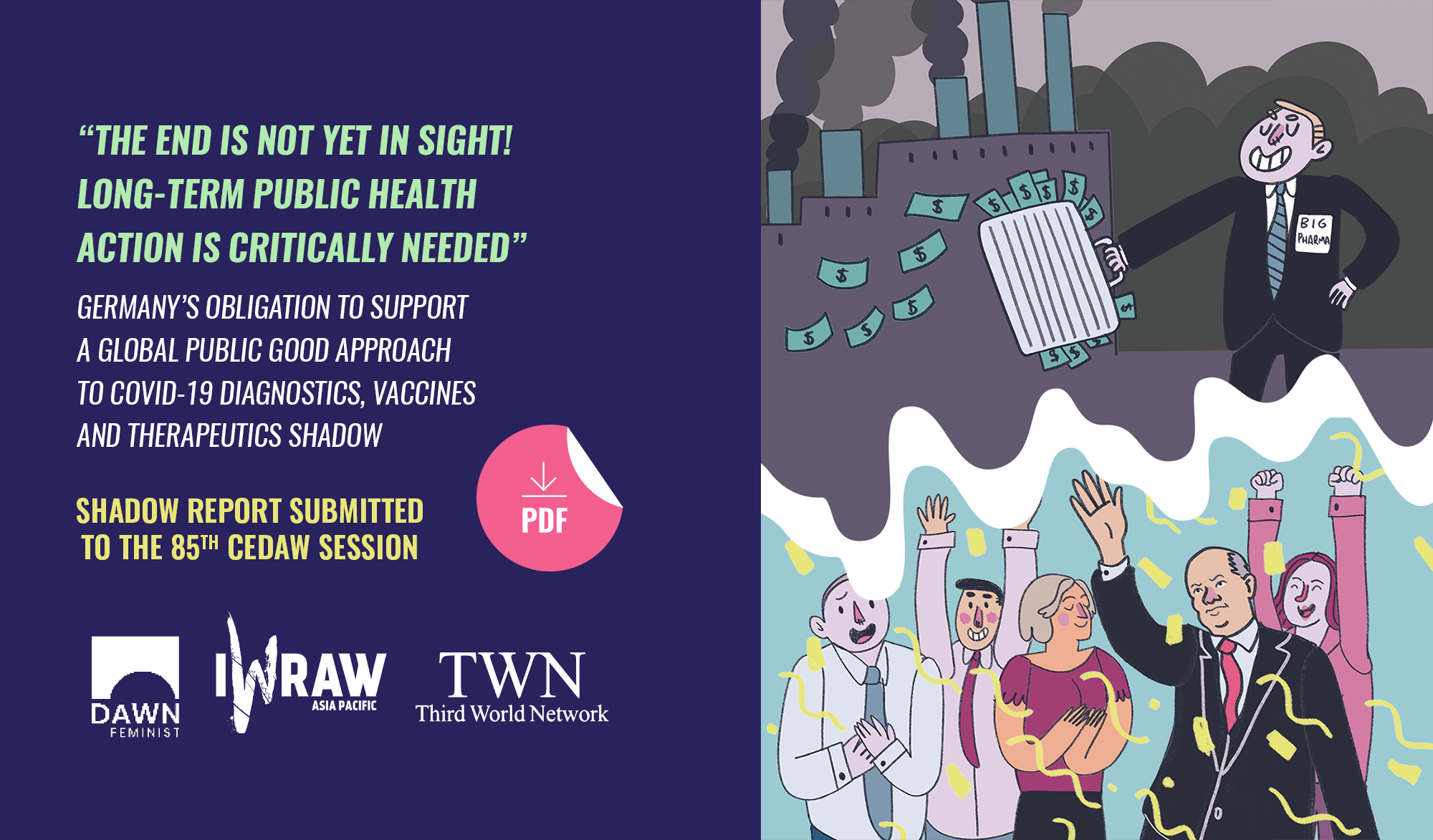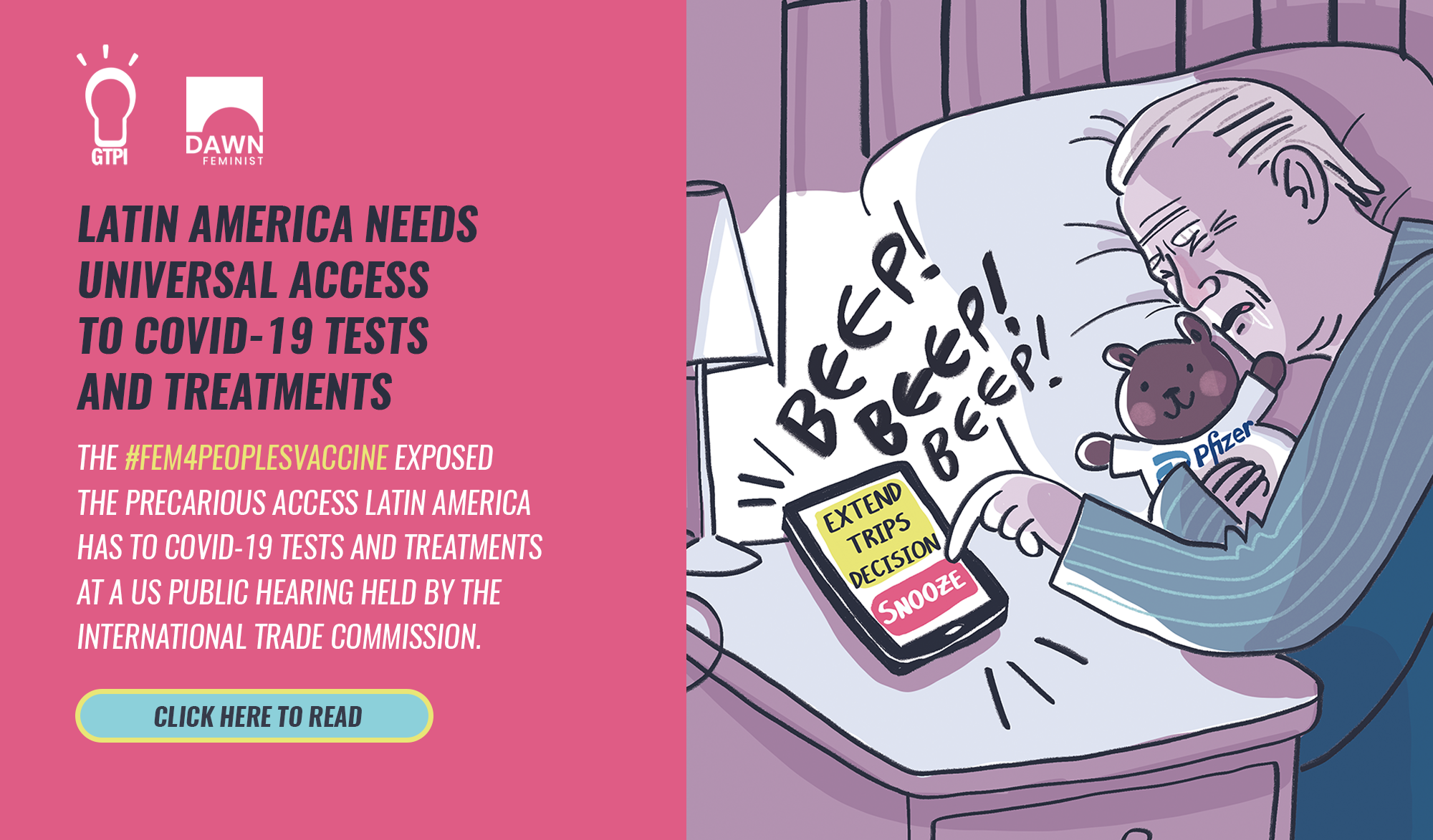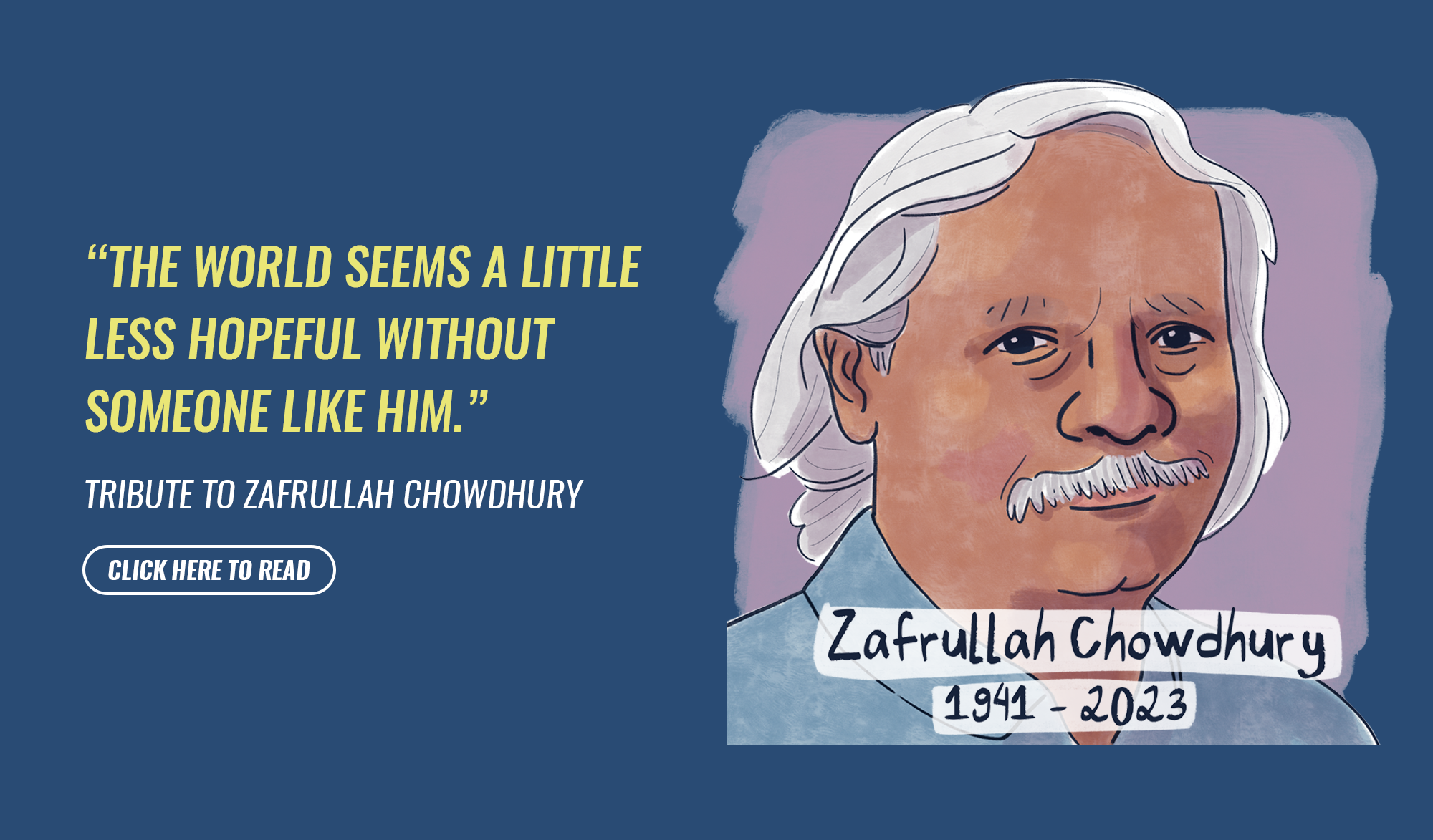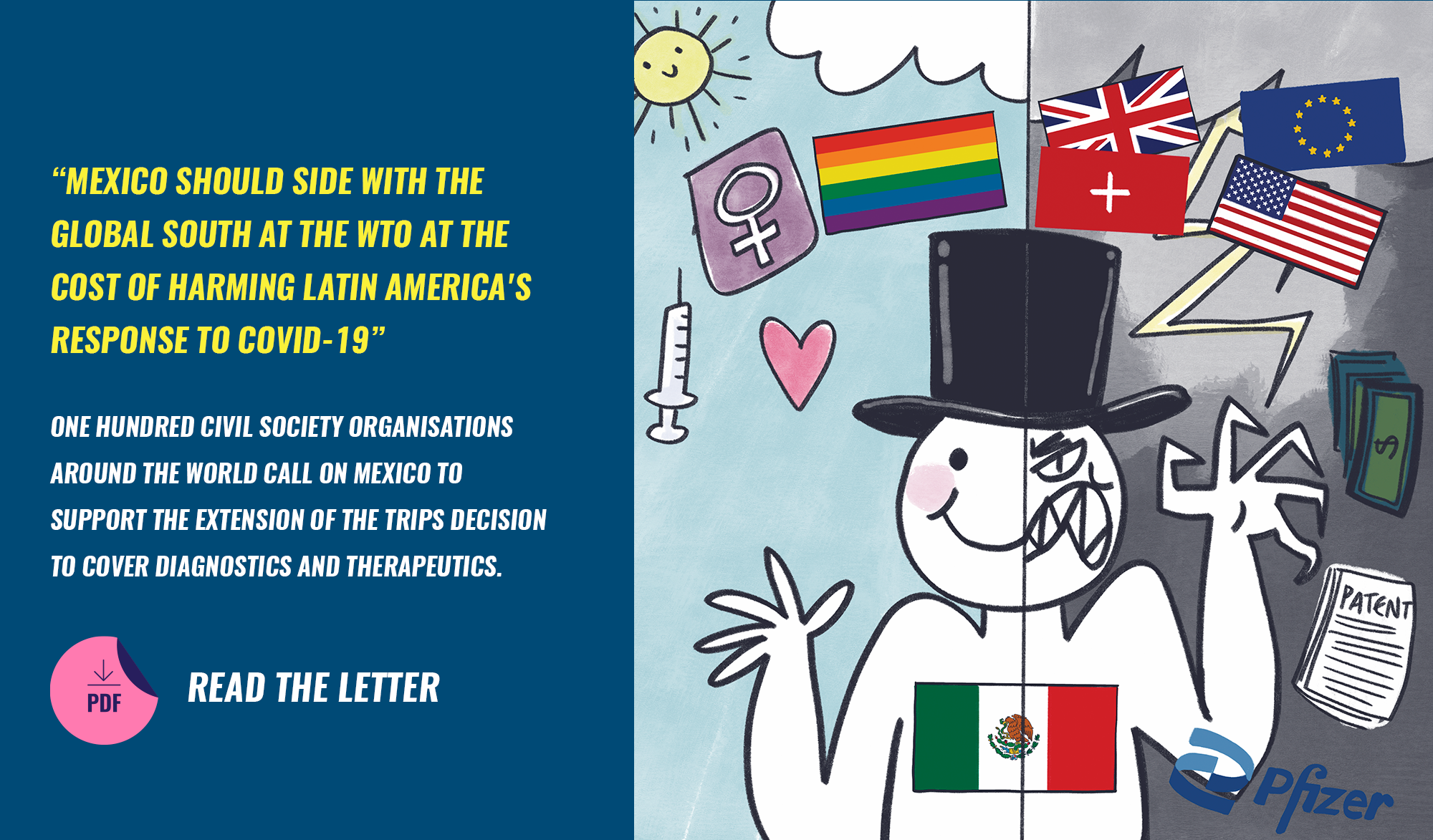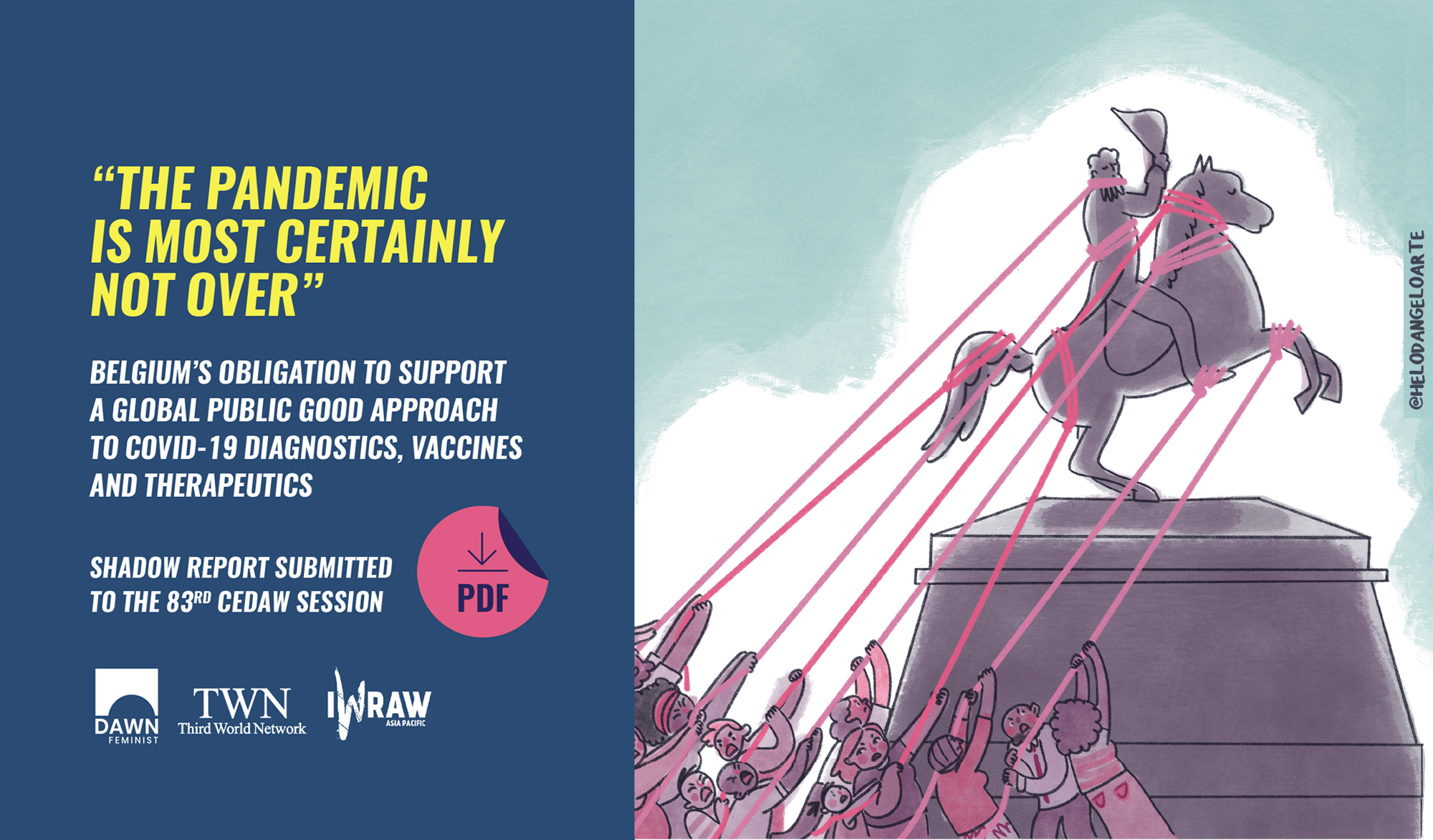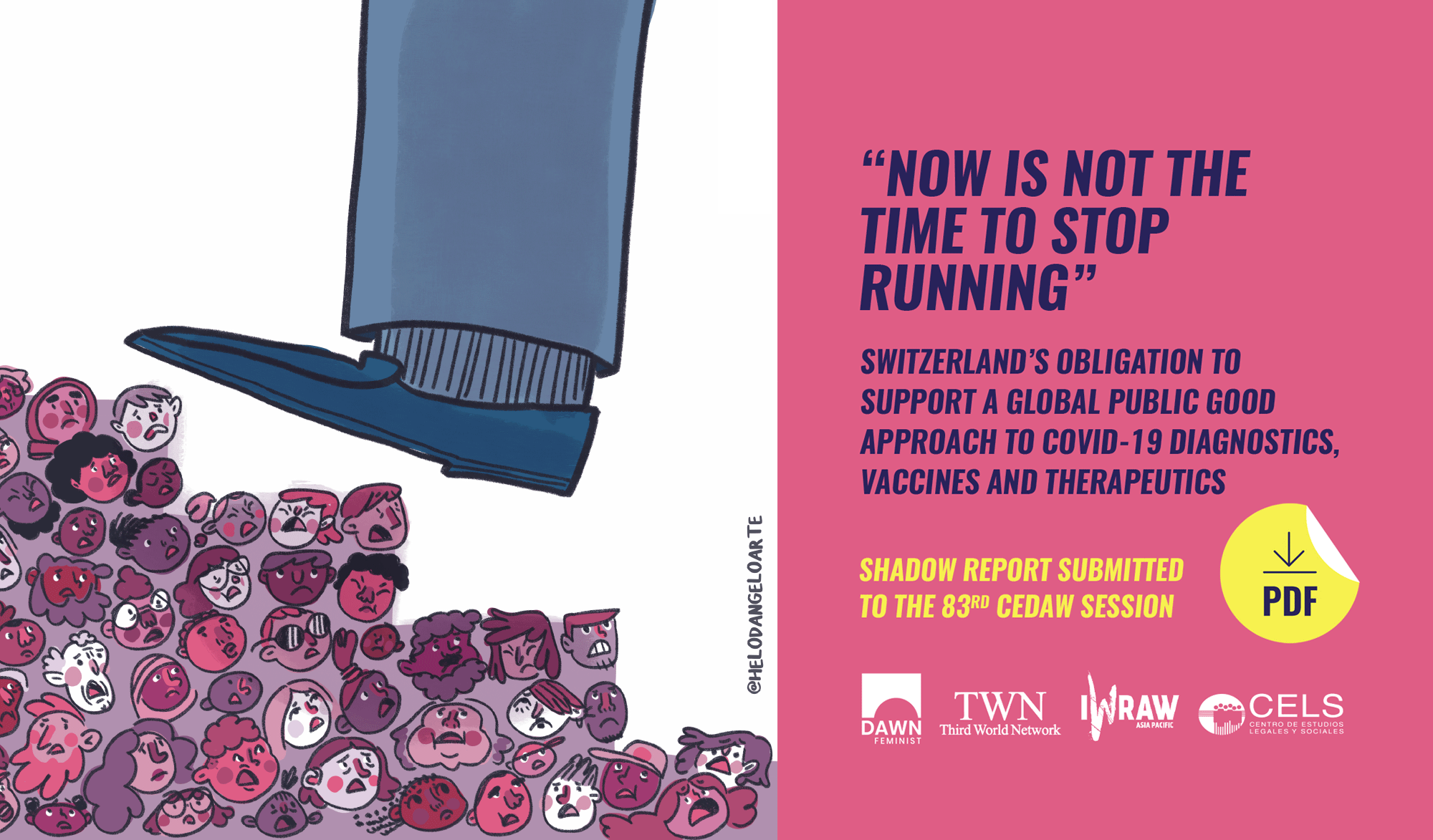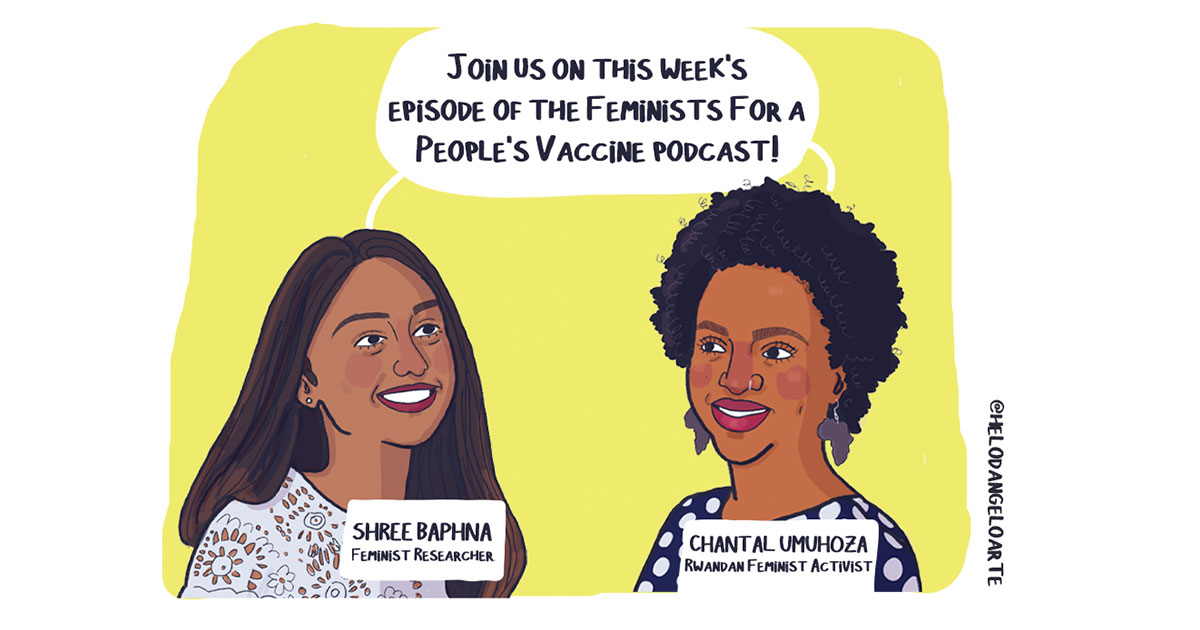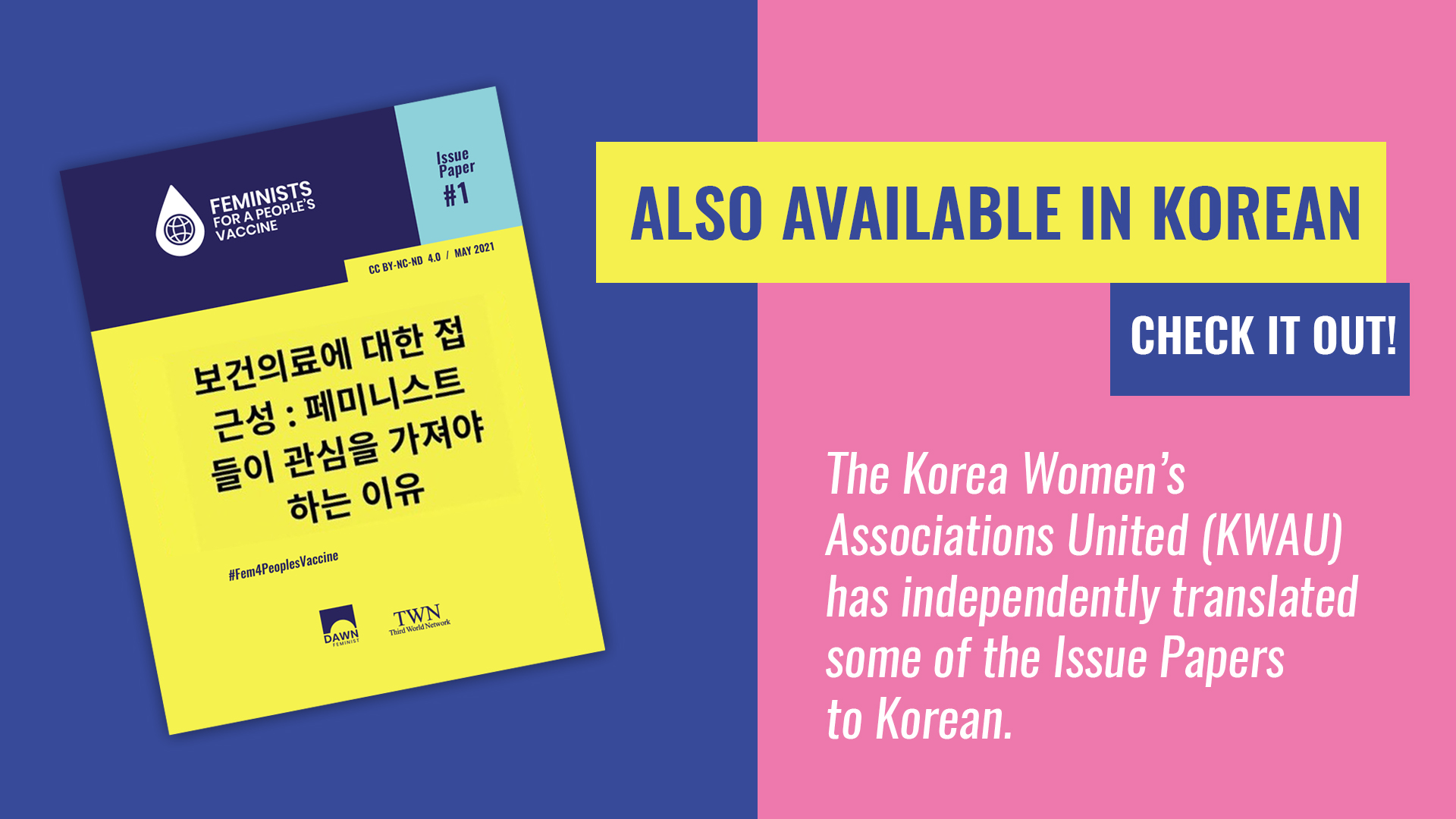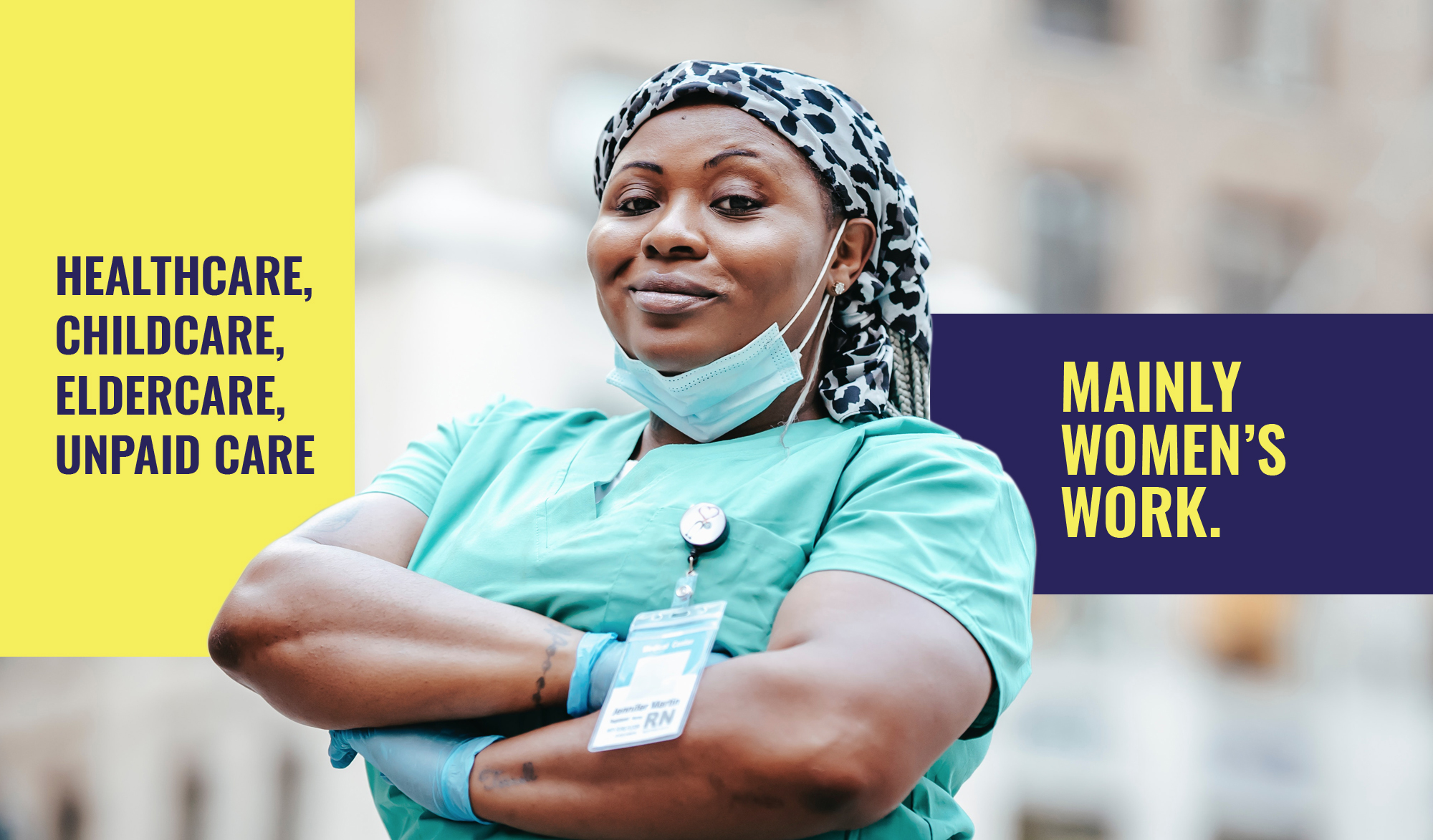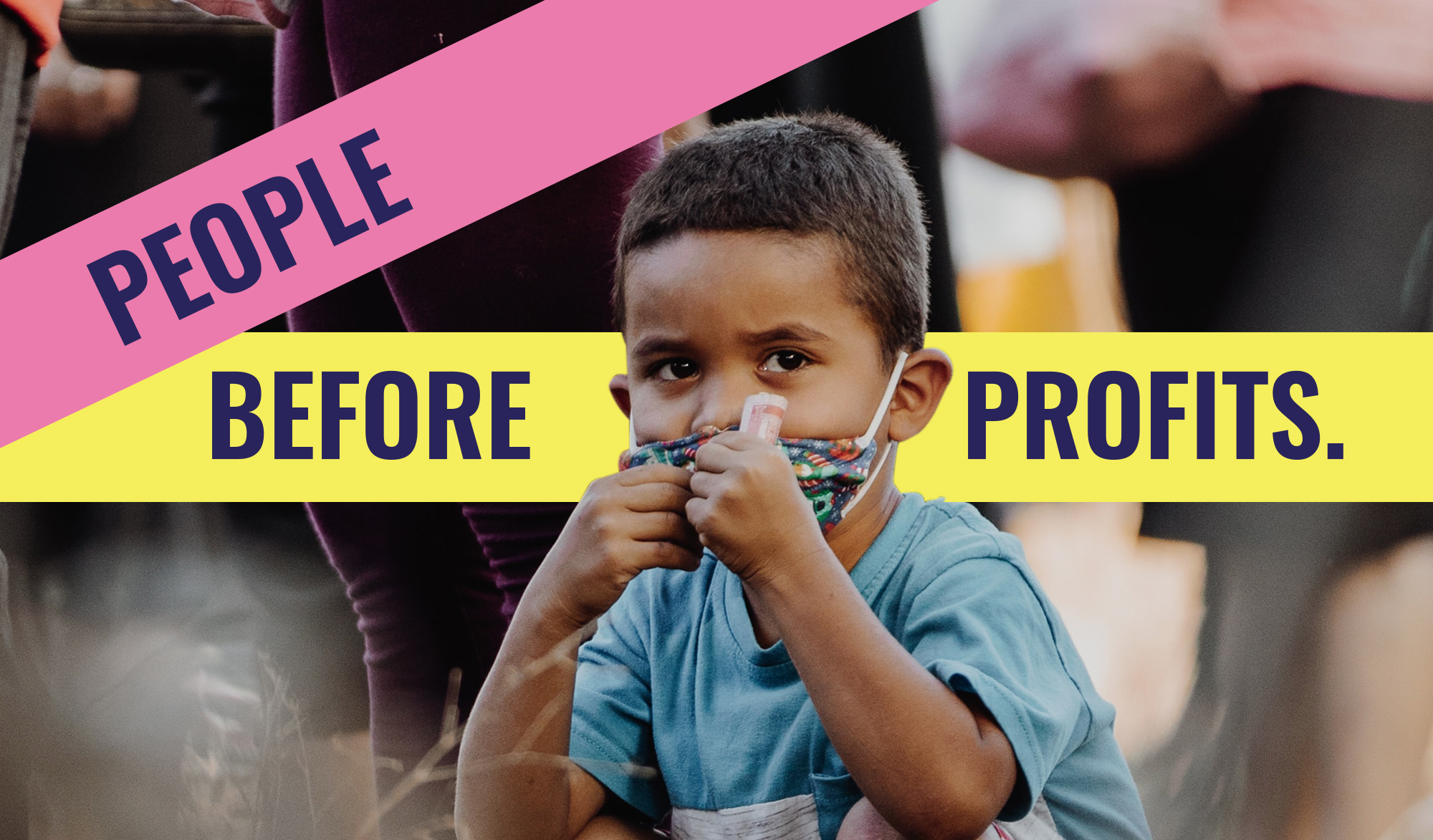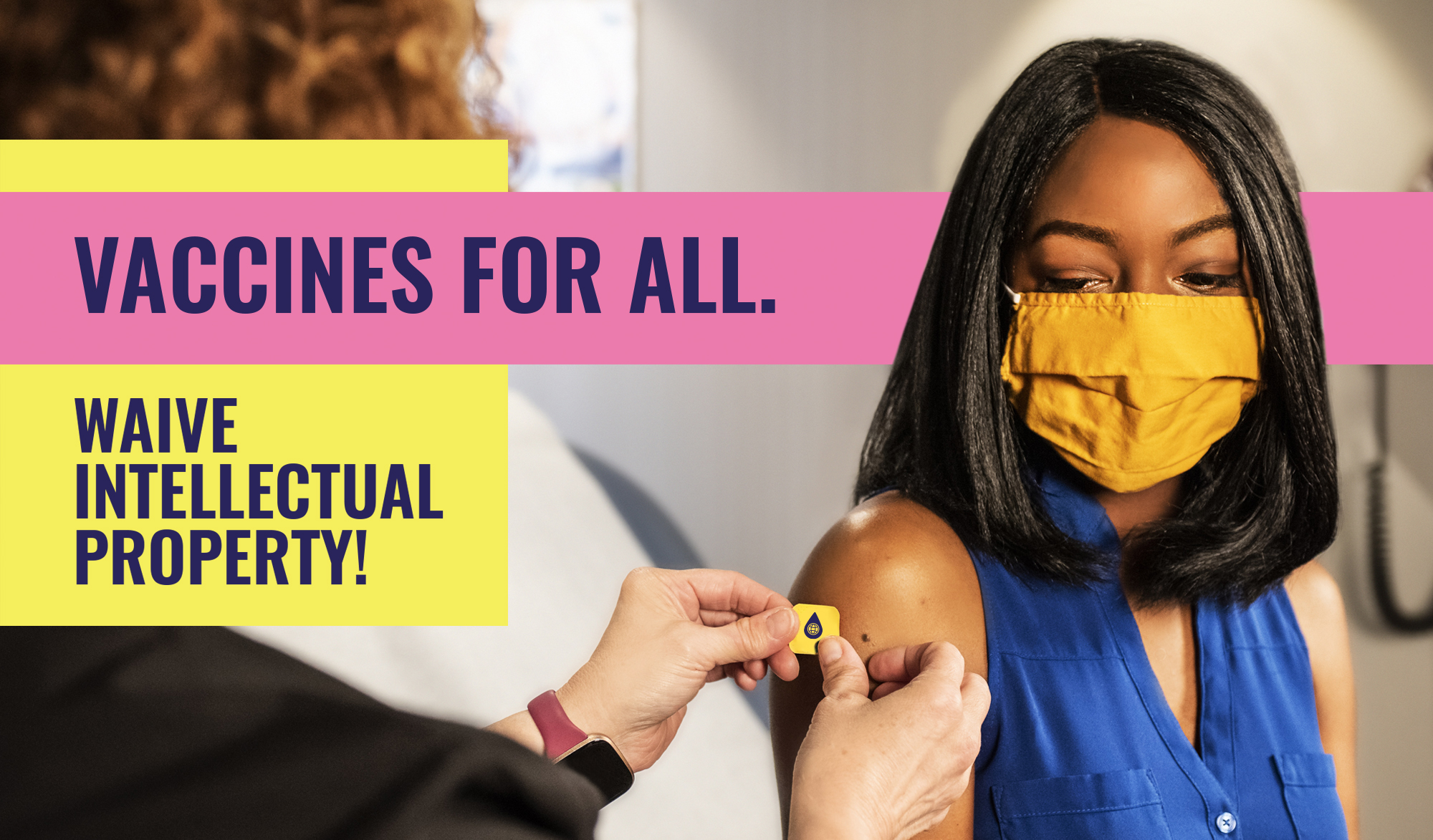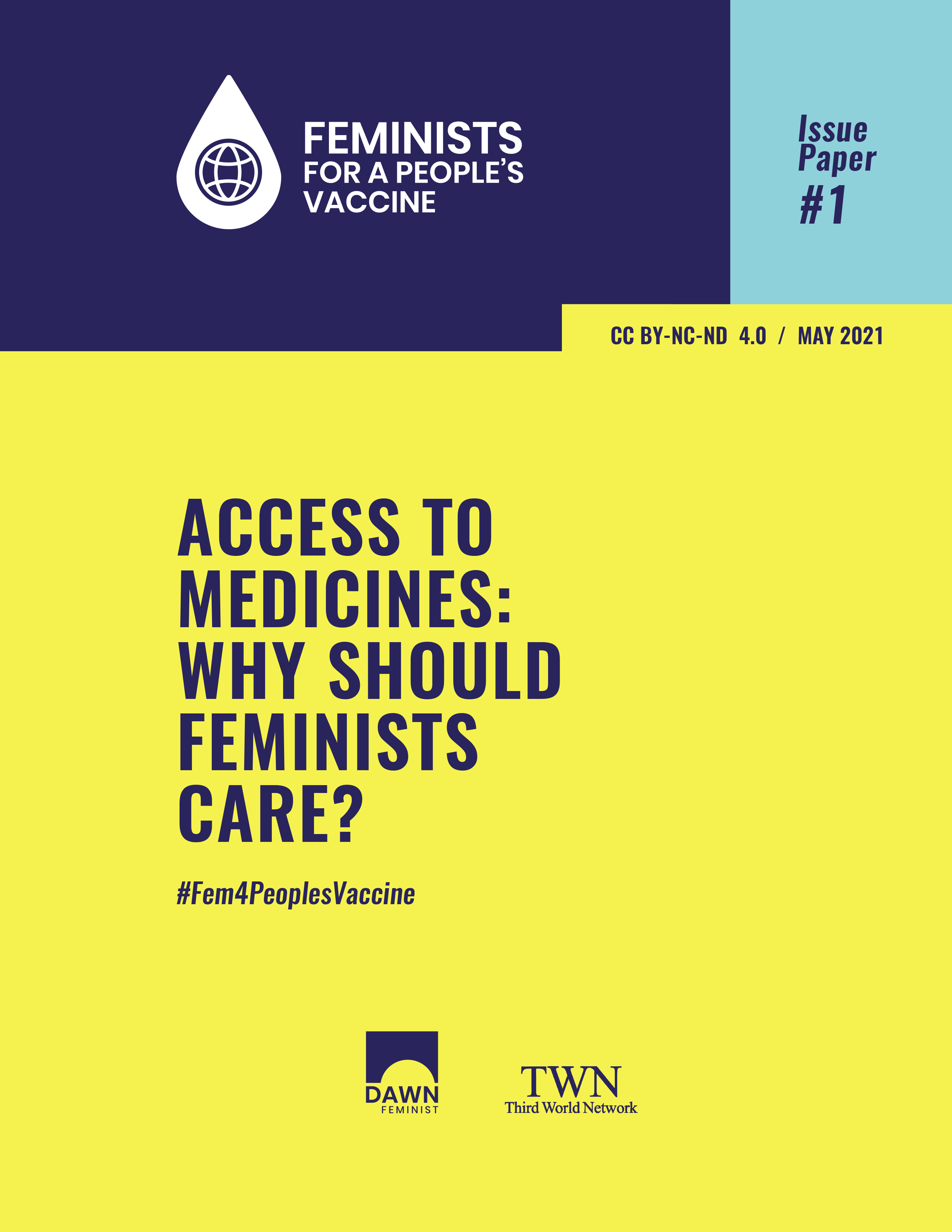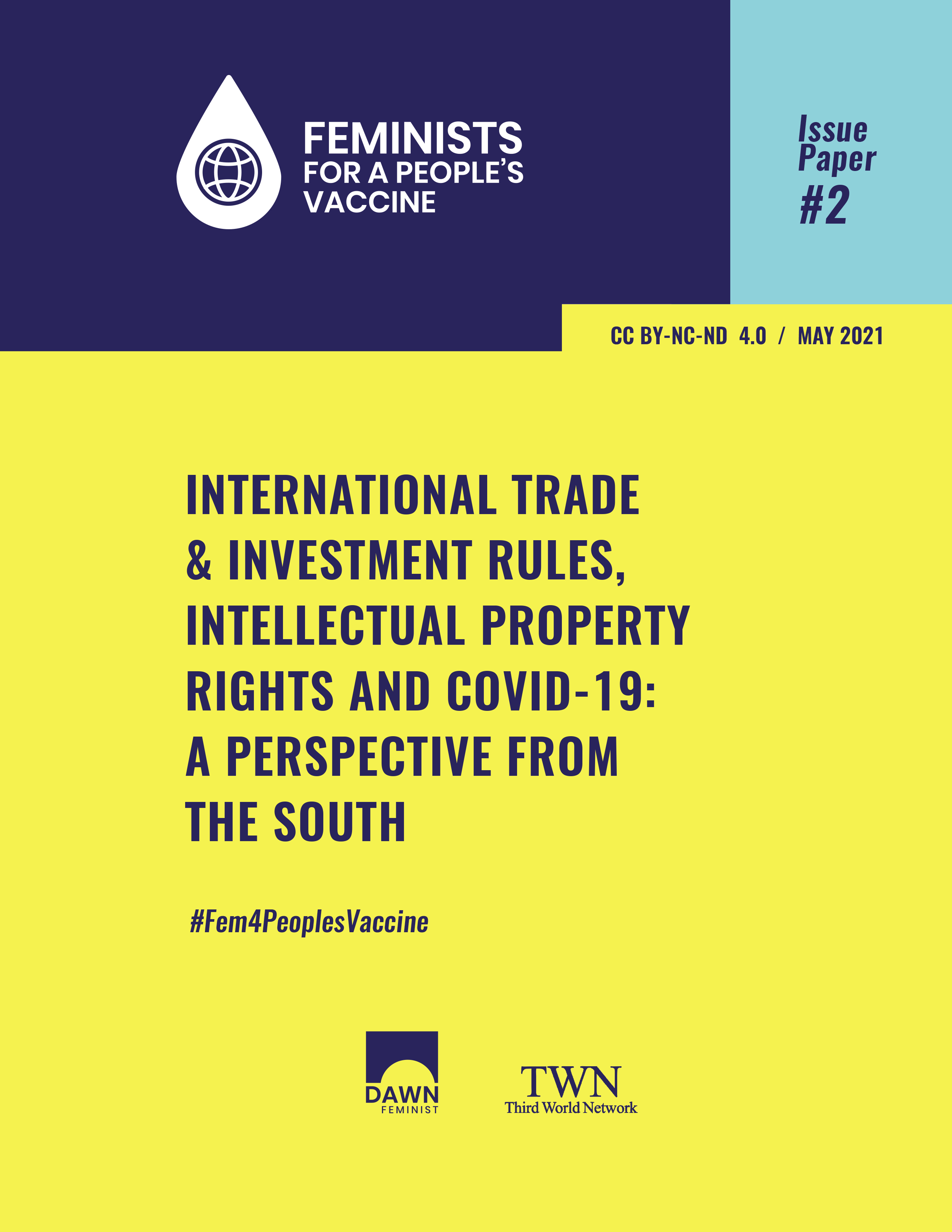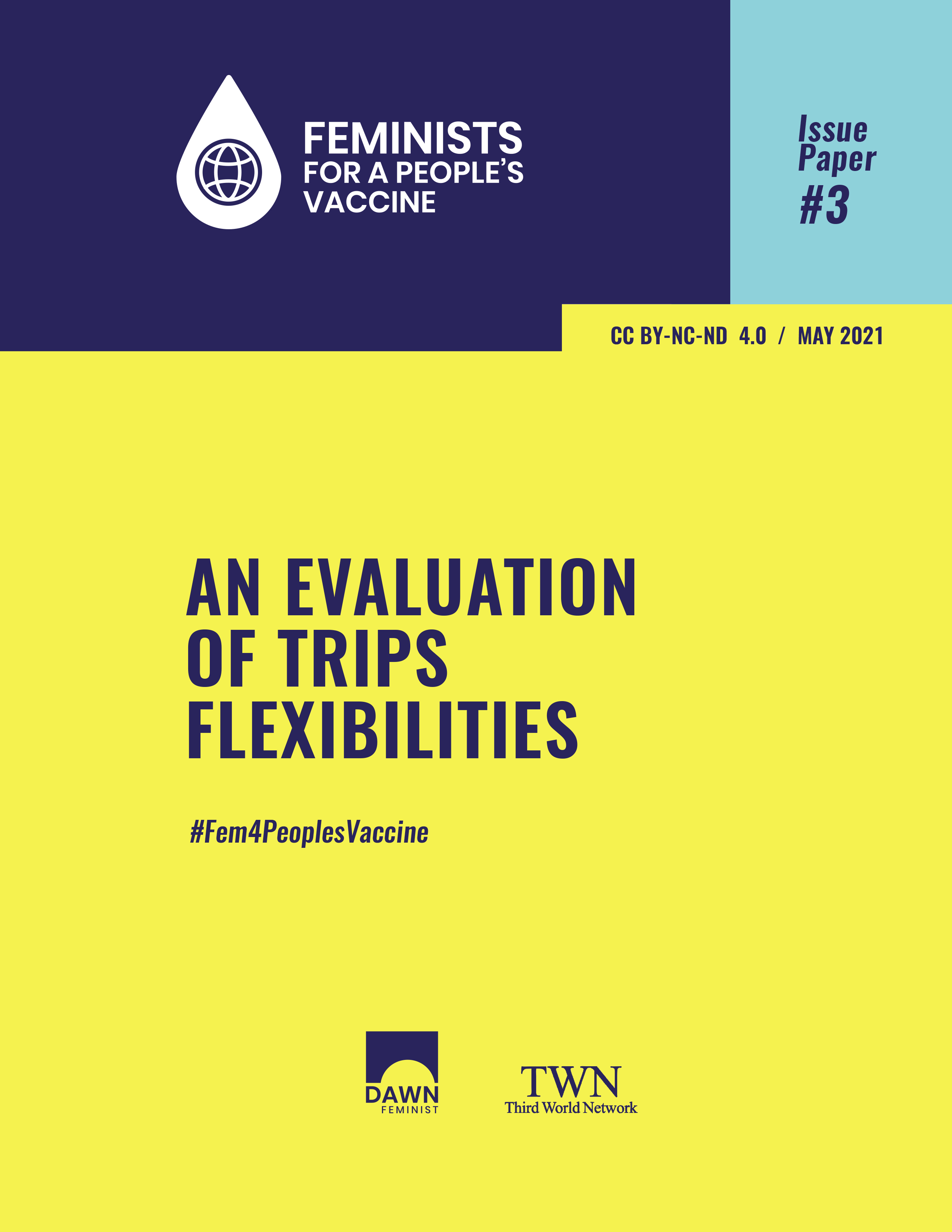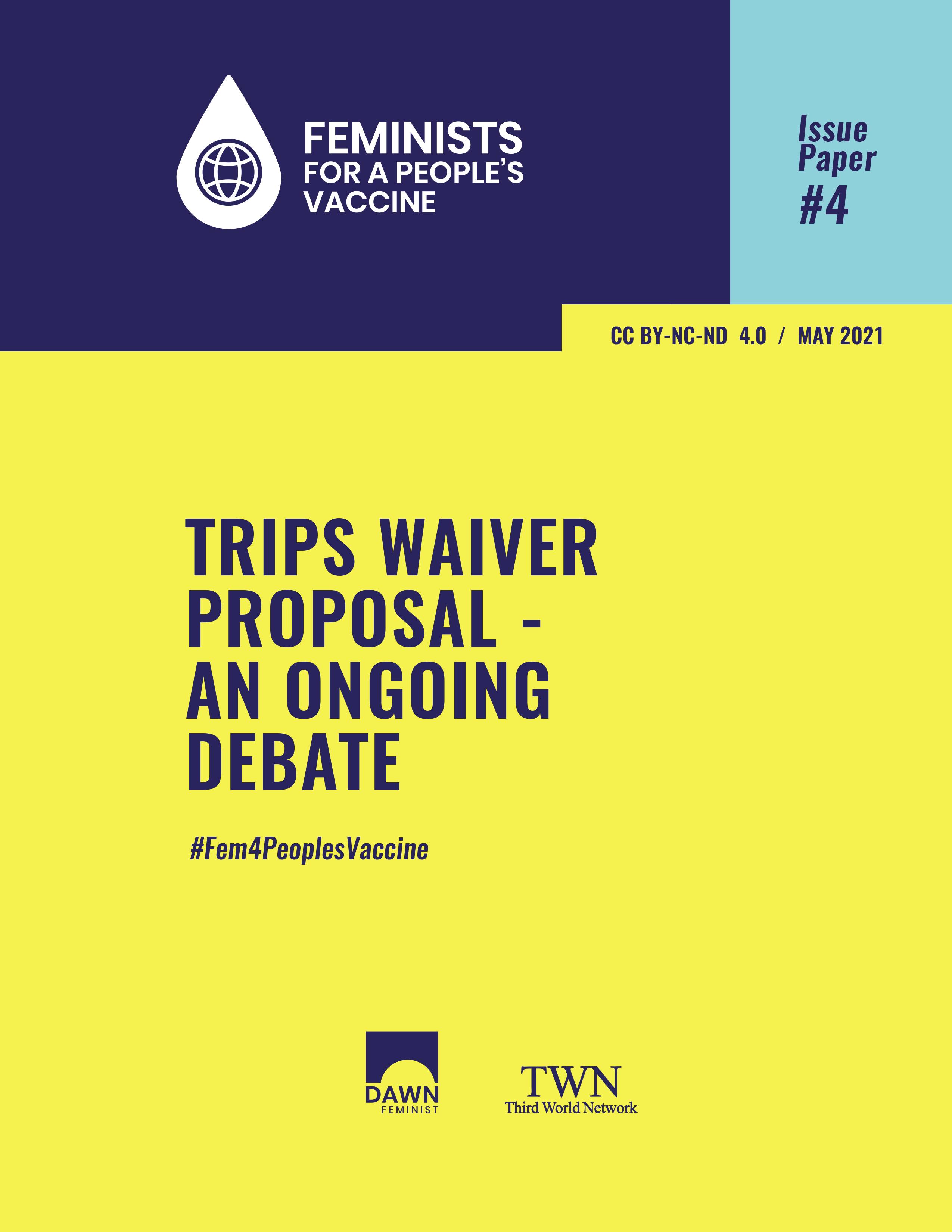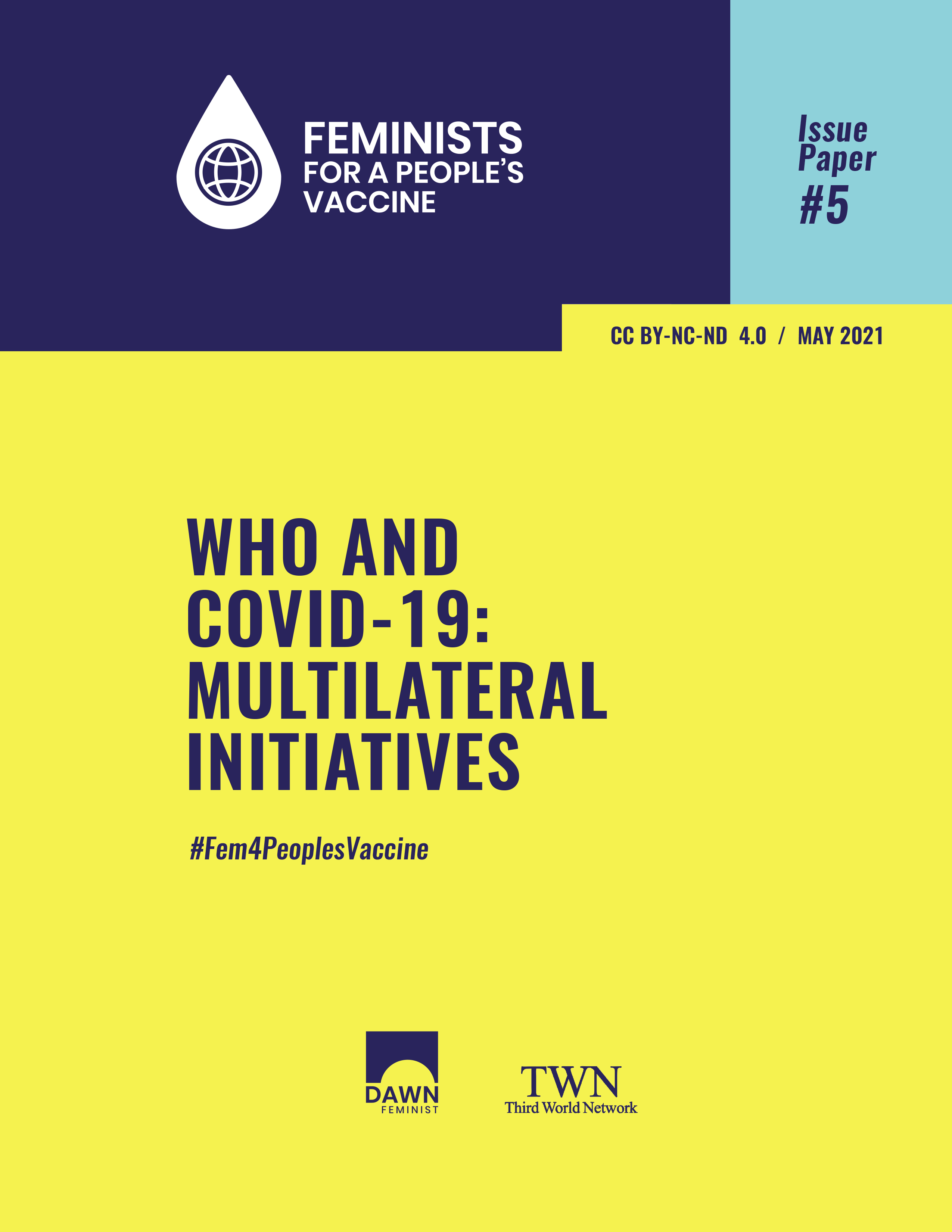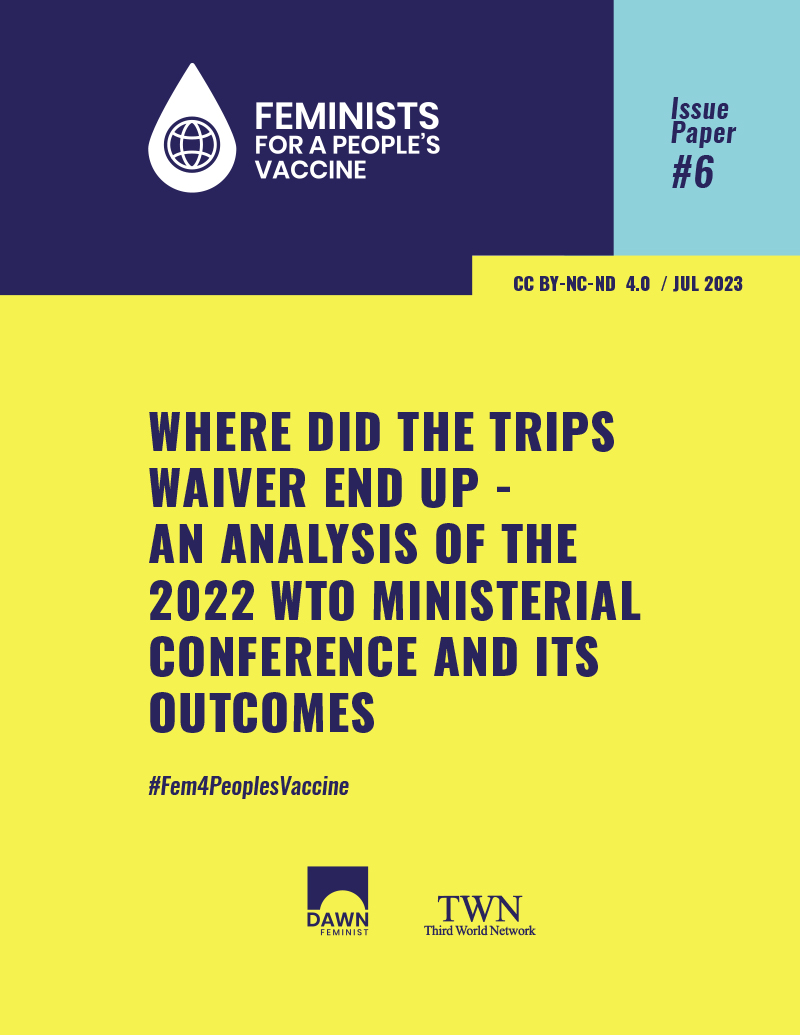About
Covid is an emergency, not a business opportunity.
Development Alternatives with Women for a New Era (DAWN) and Third World Network (TWN) are facilitating the Feminists for a People’s Vaccine Campaign (FPV) for equitable, accessible, and affordable COVID-19 vaccines, therapeutic drugs, diagnostics and other medical equipment—Access to Medicines or A2M for short.
The FPV Campaign brings the unique perspective of feminists from the Global South and our partners and allies in the North to challenge the causes and consequences of extreme inequalities in access to medicines. Geography, wealth, income, gender, race, caste, ethnicity, disability, sexual orientation, gender identity and other factors shape who has access and who has not, who will live and who will die.
We analyse and question the rapidly changing pandemic panorama and shed light on key players. We look closely at initiatives such as the waiver proposal on implementing the Trade-Related Aspects of Intellectual Property Rights Agreement (TRIPS), administered by the World Trade Organization (WTO), the COVAX Facility and the South versus North imbalance in global trade, investment and financing.
Development Alternatives with Women for a New Era (DAWN) and Third World Network (TWN) are facilitating the Feminists for a People’s Vaccine Campaign (FPV) for equitable, accessible, and affordable COVID-19 vaccines, drugs, therapeutics, and equipment—Access to Medicines or A2M for short.
The FPV Campaign brings the unique perspective of feminists from the Global South and our partners and allies in the North to challenge the causes and consequences of extreme inequalities in access to medicines. Geography, wealth, income, gender, race, caste, ethnicity, disability, sexual orientation, gender identity and other factors shape who has access and who has not, who will live and who will die.
We analyse and question the rapidly changing pandemic panorama and shed light on key players. We look closely at initiatives such as the waiver proposal on implementing the Trade-Related Aspects of Intellectual Property Rights Agreement (TRIPS), administered by the World Trade Organization (WTO), the COVAX Facility and the South versus North imbalance in global trade, investment and financing.
The Campaign includes global, regional, and national groups from across Sub-Saharan Africa and MENA, Latin America, the Caribbean, East, South-East, and South Asia, the Pacific and other allies. Two meetings, one held in March, another in May 2021, created synergies through discussions and explored future collaborations. We established Working Groups in this process to focus on 1) Global Analysis & Campaign; 2) Regional analysis, campaign and networking; 3) Communications.
The FPV campaign builds knowledge through analysis and action. An evolving set of resources combines feminist analysis with salient information on the latest developments on key issues such as the TRIPS Waiver proposal led by India and South Africa at the WTO, Issue Papers, Podcasts and ‘DAWNTalks’ an online discussion series among others. They are designed to provide information and analysis to better understand the complex politics and processes at work, and trigger engagement and deeper discussions on the way forward to more equitable access to medicines worldwide.
The Feminists for a People’s Vaccine (FPV) is encouraging feminist groups and organizations across the globe to volunteer for Working Groups and engage globally and/or regionally/nationally to expand the scope and depth of the campaign.
Read more about the campaign ↓
Issue Papers
To better understand, discuss and share
Podcasts
A Feminist Approach to the Pandemic
List of episodes
-
#19: Lessons Learned from the Pandemic in Asia and the Pacific Region
with speakers Sai Jyothirmai Racherla, Priyanka Chandra, Tu Anh Hoang and Tasnim Azim
-
with speakers Kruskaya Hidalgo Cordero, Manuella Donato and Natalia Marsicovetere
-
#17: Lessons Learned from the Pandemic in Africa
with speakers Khoudia Sow and Leah Ereyenyu
-
#16 A Fair and just Pandemic Response Thorough a Feminist Intersectional Approach
with Cristiane Pereira and Sara Davis
-
#15 – A 101 on the IHR and the Pandemic Instrument
with Vanita Mukherjee & Nithin Ramakrishnan
-
#14 – Two UN Special Rapporteurs meet: the right to health mandate on the table
with Chee Yoke Ling, Tlaleng Mofokeng & Anand Grover
-
#13 – What AIDS can teach us about COVID-19
with Rajnia de Vito, Shree Baphna & Richard Parker
-
#12 – A human rights-based approach to COVID-19
with Constanza Pauchulo, Camila Maia & Meena Jagannath
-
#11 – What is the main takeaway from the MC12 process?
with Ranja Sengupta & Chee Yoke Ling
-
#10 – What Lessons Has Covid-19 Taught Us So Far?
with Ariane Abreu & Dr Satyajit Rath
-
#9 – IP, TRIPS Waiver & the Knowledge Economy
with Shree Baphna & Hyo Yoon Kang
-
#8 – If Not Now, When? The Need to Adopt the TRIPS Waiver
with Clara Alves & Sangeeta Shashikant
-
#7 – What is Brazil doing to guarantee universal access to Covid-19 health technologies?
with Rajnia de Vito & Felipe Carvalho
-
#6 – How Can Feminists From The Global South Imagine A Post-Pandemic World?
with Shree Baphna & Chantal Umuhoza
-
#5 – To Vaccinate The World We Need Tech Transfer, Not Charity
with K.M. Gopakumar & Marlise Richter
-
#4 – Access to Vaccines and Medicines is a Human Right
with Farida Shaheed and Kumi Samuel
-
#3 – The Right to Health: Patent Monopoly and Access to Medicines
With Molly Jagpal and Chee Yoke Ling
-
#2 – Disability, Gender and Access to Medicines
with Nidhi Goyal and Vanita Nayak Mukherjee
-
#1 – Why Should Feminists Care about Access to Medicines in the Context of COVID-19?
with Gita Sen and Sonia Corrêa
Episode #19
How did the pandemic expose deep-rooted health inequities in Asia and the Pacific region? And what can we learn to build more just, inclusive healthcare systems for the future?
In this episode, Sai Jyothirmai Racherla (Deputy Executive Director at ARROW) moderates an insightful discussion with:
📚 Priyanka Chandra – Team Lead, Gender and Transitional Justice Programme
🌍 Tu Anh Hoang – Founder & Director, Center for Creative Initiatives in Health and Population (CCIHP)
👩🔬 Tasnim Azim – Adjunct Professor, James P. Grant School of Public Health, BRAC University
Together, they discuss how the pandemic exposed systemic health inequities among vulnerable communities in the Asia Pacific Region, highlighting critical lessons for building inclusive, just, and health systems during future pandemic responses.
From community mobilization to the importance of policies rooted in Equity, Diversity, and Inclusivity (EDI), they share powerful stories of resilience—like sex workers delivering life-saving medication when health facilities were shut—and explore what governments must do to ensure no one is left behind.
🎧 Tune in now to hear feminist perspectives on public health and pandemic justice!
Episode #18
En este episodio del pódcast #Fem4PeoplesVaccine, exploramos la intersección entre salud pública, desigualdad y perspectivas feministas en América Latina. Conducido por la activista feminista Kruskaya Hidalgo Cordero, radicada en México, este diálogo reúne a dos destacadas investigadoras: Manuella Donato, de Brasil, y Natalia Marsicovetere, de Guatemala.
Manuela comparte hallazgos de su investigación sobre los impactos de la pandemia, resaltando cómo medidas autoritarias disfrazadas de gobernanza democrática profundizaron las desigualdades existentes. Destaca el impacto desproporcionado en grupos vulnerables, incluyendo trabajadores informales, migrantes y personas trans, y analiza cómo políticas regresivas agravaron la violencia sistémica.
Natalia, investigadora independiente en temas de género en la Ciudad de Guatemala, examina las duras realidades de la respuesta a pandemia en Centroamérica. Señala cómo la militarización de los toques de queda y las políticas sanitarias restrictivas dejaron en una situación de extrema vulnerabilidad a los trabajadores informales, las poblaciones rurales y las personas de género diverso. Además, subraya los efectos devastadores de la pandemia en el acceso a los servicios de salud sexual y reproductiva, incluyendo el aumento de la mortalidad materna y las barreras para el acceso al aborto seguro.
Juntas, estas académicas feministas analizan la necropolítica—la priorización estatal de unas vidas sobre otras—y abogan por soluciones interseccionales y comunitarias para futuras crisis de salud pública.
Sintoniza este episodio para profundizar en estos temas urgentes y sus implicaciones en la equidad en salud en América Latina.
Episode #17
In this #Fem4PeoplesVaccine podcast, we look at how COVID-19 impacted communities in Africa. The pandemic exacerbated existing inequalities that were further deepened by State-led authoritarian approaches to lockdown measures. Marginalised groups, especially women and adolescent girls as well as Indigenous communities in Africa, were disproportionately affected.
The podcast moderated by Adija Adamu of the International Indigenous Women’s Forum and the Ayni Fund, with speakers Khoudia Sow and Leah Ereyenyu, examines how the disruption of health services and access to health-related services such as HIV testing, resulted in high teen pregnancy rates, and new HIV infections among adolescent girls.
Khoudia is a physician and researcher at the Regional Research and Training Center in Senegal while Leah leads the Gender Just Economy Learning Community at the Trust Accountability and Inclusion Collaborative.
#pandemicresponse #access2medicines #healthequity #fem4peoplesvaccine
Episode #16
ln this #Fem4PeoplesVaccine podcast episode, we take a deep dive into the intricate relationship between inequality and intersectionality with the COVID-19 pandemic as our setting. We explore
the pandemic’s profound impact on access to health and medicines. Factors such as race, class, and gender intersect and profoundly shape a person’s ability to navigate and recover from
a pandemic.
To shed light on these crucial issues, we are joined by Cristiane Pereira, a researcher from Sao Paulo, Brazil, who has focused on the pandemic’s effects on women and international cooperation’s im pact on the Brazilian health system. Cristiane is in conversation with Professor Sara Davis from Griffith University, Australia, who serves as the deputy director of the lndo-Pacific Centre for Excellence for the Elimination of Violence Against Women.
#pandemicresponse #access2medicines
Episode #15
The International Health Regulations is the United Nation’s legal framework that guides countries on how to deal with public health emergencies of international concern. With COVID-19, the amendment process of the IHR became an urgent matter for Global South countries. In parallel, a proposal for a Pandemic Instrument also came into the picture.
In this episode, Indian feminist Vanita Mukherjee (DAWN) interviews Indian lawyer Nithin Ramakrishnan (TWN) on the origins of IHR, the proposals for its amendment, how it affects people and the politics at play.
Episode #14
The UN Special Rapporteur is appointed to watch, monitor, visit countries and investigate specific rights and the ways in which they are protected and promoted. They identify and analyse trends and come up with recommendations.
On this #Fem4PeoplesVaccine podcast episode, Chee Yoke Ling (Third World Network) interviews two UN Special Rapporteurs on the Right to Health. They have both been in a ‘unique’ situation where the world was caught in the midst of a pandemic. Tlaleng Mofokeng took on the role in May 2020 when COVID-19 exploded across the world and Anand Grover’s mandate endured the thick of the HIV/AIDS pandemic, between 2008 and 2014.
These historic moments have many parallels, particularly when we consider how intellectual property was the focus of attention by both civil society and States. They challenged Big Pharma’s monopoly in the struggle for universal access to antiretrovirals during the HIV/AIDS pandemic and currently are doing the same for COVID-19 vaccines, diagnostics and therapeutics.
Episode #13
The recent declarations of success against the COVID-19 virus are well known to HIV/AIDS activists. Behind these false allegations, there are many political interests. Governments evoke the “urgency of normal”, but even if this can be reasoned via economic arguments, it neglects the most vulnerable populations who still develop severe cases of the disease, including many cases leading to deaths to this day (almost 2.000 confirmed deaths per day). It also leaves out entire nations where vaccination rates are insufficient—only 25% of people in low-income countries received one dose of a COVID-19 vaccine. Furthermore, it neglects the imminent rise of new and more infectious variants.
If early in the COVID-19 pandemic one of the political conflicts was between denialists on one side and public health experts, activists and progressive governments on the other, now experts and activists are alone on this side of the fight.
The HIV/AIDS pandemic has a lot to teach us about how we think of health and rights but also about geopolitics more broadly. It’s a historic moment in global public health, and if we look at it carefully, we can find clues to how global health dynamics came to be what it is today. It can help us shed light on the failures to deal with COVID-19 in a just and equitable way and perhaps point towards new directions for resolving this lingering pandemic and being better prepared for the next one.
Join Dr Richard Parker, a veteran HIV/AIDS activist, dissect the “end of the pandemic” discourse.
Episode #12
Although the right to the highest standard of health is a universal one, the COVID-19 epidemic did not and does not reflect this. The severity of covid-19 is validated in a recent article published in BMJ. COVID-19 didn’t cause the world’s imbalances, but it didn’t help, either. Neither did the activity (or lack thereof) of individual countries.
But there is a way to make States accountable. Constanza Pauchulo (IWRAW AP), Camila Maia (CELS) & Meena Jagannath (Movement Law Lab) tell the stories of how they activated the international human rights system against the failure of States and also pharma companies to prevent and eliminate gender and racial discrimination in the pandemic.
Episode #11
After 2 long years since the waiver in intellectual property was tabled, what has the WTO delivered on equitable access to Covid-19 health technology? More specifically, how can we make sense of what happened at the 12th WTO Ministerial Conference and what does that mean for countries’ ability to respond to the pandemic?
Tune in to the newest episode of the #Fem4PeoplesVaccine podcast. Join Ranja Sengupta (TWN) in an interview with Chee Yoke Ling, Director at the Third World Network (TWN), who was actively engaged in the high-level advocacy process for the waiver. Yoke Ling shares her assessment of the WTO’s 12th Ministerial Conference process and outcomes, what we can celebrate, and what challenges lie ahead as the pandemic unfolds.
Episode #10
Join Indian immunologist Dr Satyajit Rath in a conversation with Brazilian public health expert Ariane Abreu on the Covid-19 trajectory and its parallels with other pandemics.
Navigating through the clutter of information on whether omicron is the end of the pandemic, Dr Rath and Ariane discuss the limitations and blindspots of such widely disseminated discourses when considering such stark differences in the availability of health data and resources across and within countries. They try to interpret the Covid-19 virus trends in light of past experiences, how governments have responded to it and who are those most affected by it.
Episode #9
Join Dr Hyo Yoon Kang (Kent University Law School) and Shree Baphna (FPV) in a discussion that sheds light on the structural perspective of the TRIPS waiver, the TRIPS agreement, intellectual property, and the knowledge economy more broadly.
Fortuitously, this episode is launched as the WTO members meet to discuss the TRIPS waiver in the lead-up to the 12th WTO Ministerial Conference on June 12th, 2022.
Episode #8
The WTO Ministerial Conference—one of the most important events in the organization’s calendar, when State representatives gather—is approaching. On the week of June 13th, the TRIPS Waiver will be on the agenda of the day and pressure for a consensus will be high.
Since its tabling, the EU and the US have pulled out all the tricks in their hats in an attempt to block the measure designed to fight vaccine inequality. Listen to the discussion between Clara Alves (MSF Brazil) and Sangeeta Shashikant (TWN), who has been at the forefront of the advocacy work at the WTO. Sangeeta shares her precious perceptions about the measure, multilateralism issues, pandemic preparedness and activism.
Episode #7
Episode #6
How can we put a Southern feminist perspective to good use and tackle the issues brought to light by the Covid-19 pandemic? In this Feminists for a People’s Vaccine Podcast episode, the young Indian feminist researcher Shree Baphna (DAWN) and Rwandan feminist activist Chantal Umuhoza (Spectra) discuss the need to decolonise international economic and political relations, especially in relation to African geopolitics. They talk about gender-based violence through a macro-political lens, connecting the phenomenon to uneven power structures between the Global South and North, and much more. Listen, learn and join the conversation!
Episode #5
South African feminist researcher and activist Marlise Richter (Health Justice Initiative) and Indian legal adviser and senior researcher K.M. Gopakumar (Third World Network) discuss how the global order alone is not able to promote equity in access to medicine due to its uneven structure. They analyze how current measures proposed by developed countries to donate Covid-19 vaccine doses or give voluntary technology licensing are stalling strategies to prevent bolder actions regarding tech transfer.
Listen from the people who are on the frontlines of the struggle to end this pandemic once and for all, join us and take action!
Episode #4
How is human creativity a matter of human rights, and how is access to vaccines related to it? In this episode, Kumi Samuel (DAWN, Sri Lanka) and Farida Shaheed (Shirkat Gah, Pakistan) have an inspiring conversation about cultural rights during the Covid-19 pandemic and reflect on possible ways in which the Feminist Movement can engage to push for vaccine access and equity for all. Listen, learn and join the conversation!
Episode #3
We are all familiar with the right to health as a human right. But what about so-called Intellectual Property Rights? What does it have to do with Health as a human right? Malaysian expert lawyer Chee Yoke Ling explains how Intellectual Property systems operate under international law, how this leads to patent monopoly and why it undermines Access to Medicines to people all over the world. Listen, learn, and take action!
Episode #2
Feminist activist Vanita Mukherjee (DAWN) talks to Indian disability and gender rights activist Nidhi Goyal (Rising Flame) about the experiences of women with disabilities during the pandemic. Nidhi, who’s also a stand-up comedian, and has recently been appointed to the UN Women Executive Director’s advisory group, reflects on access to vaccines for people with disabilities as well as other themes often left on the sidelines of the broader Right to Health debate. Have we unpacked the whole idea of what access looks like for people in all their diversity? Listen, learn and take action!
Episode #1
Indian feminist economist, Gita Sen and Brazilian feminist author Sonia Corrêa discuss the obstacles to access to medicines in general, and in the context of the Covid-19 pandemic. Gita shares an evaluation of where we are today in this journey, and what can be learnt from previous experiences, such as the HIV/AIDS pandemic in the 1990s. What does the Intellectual Property/Patents system have to do with it? Listen, learn and take action!
Milestones in the fight for vaccines for all
“The time for excuses is over” – 200 CSOs Joint-Letter ahead of the WTO General Council meeting
Ahead of the WTO General Council on Feb 23, 2022, two hundred CSOs from across the world demanded WTO's Director-General Ngozi Okonjo-Iweala and Deputy Director Anabel González a bold stance and meaningful outcomes during negotiations in regards to the TRIPS Waiver.
Scotland’s First Minister Nicola Sturgeon announces support for the TRIPS Waiver and urges UK’s PM Boris Johnson to do the same
First Minister Nicola Sturgeon has written to Prime Minister Boris Johnson urging the UK Government to address international vaccine inequity. The letter asks the UK Government to join over 100 countries in supporting a temporary waiver of obligations to protect Intellectual Property for COVID-19 vaccines.
International Commission of Jurists: WTO Member States who block the TRIPS waiver are breaching their legal obligations
85 jurists from around the world argue that States who oppose waiving intellectual property rights on Covid-19 vaccines and therapeutics are infringing their legal obligations stated in different international treaties and urge, on the occasion of the 12th WTO Ministerial Conference, that Member States cooperate to ensure the full realization of comprehensive access to health.
TWN: Merck’s COVID-19 pill voluntary licence agreement only strenghtens the company’s market control
Merck and the Medicines Patent Pool (MPP) announced a voluntary licensing agreement to supply its COVID-19 pill, molnupiravir (MOL), to poor and selected middle-income countries. However, a close examination of the MSD-MPP deal reveals the use of voluntary licensing for rent-seeking purposes, according to the Third World Network.
UN independent experts call pharma companies, States, EU and WTO for urgent action on COVID-19 vaccines
Six UN independent experts sent a total of 44 letters to G7 and G20 States, the European Union, and the World Trade Organization, as well as pharmaceutical companies for urgent collective action to comply with human rights and achieve equal and universal access to COVID-19 vaccines.
The Bureau of Investigative Journalism: How Covax failed on its promise to vaccinate the world.
Conceived at the start of the pandemic, Covax pursued lofty goals, promising fair access to Covid-19 vaccines for every country worldwide, and to give them free to the poorest. For richer nations, Covax said it would act as an insurance policy. For poorer ones, a lifeline.
Co-sponsors of the TRIPS Agreement waiver explain in details the provision to WTO members
Communication tabled at the WTO to explain the basis of the waiver summarizes the interventions made by the TRIPS waiver's co-sponsor countries - the African Group, Bolivia, Egypt, Eswatini, Fiji, India, Indonesia, Jordan, Kenya, Low Income Countries group, Malaysia, Maldives, Mozambique, Mongolia, Namibia, Pakistan, South Africa, Vanuatu, Venezuela & Zimbabwe.
Moderna, Pfizer, Johnson & Johnson Must Share Vaccine Recipes
U.S. Global COVID-19 Response Coordinator Gayle Smith today urged Moderna, Pfizer and Johnson & Johnson to share technology with manufacturers in developing countries as part of an effort to boost global vaccine production in the near term through regional manufacturing hubs.
Over 100 International IP Academics Sign a Letter in Support of the TRIPS Waiver
Letter calls on governments of the UK, Australia, Brazil, Japan, Norway, Switzerland and the European Union to drop their opposition to the TRIPS Waiver proposal at the WTO and to support the waiver. Co-authored by Dr Hyo Yoon Kang (Kent Law School), Dr Siva Thambisetty (LSE), Dr Aisling Macmahon (Maynooth), Dr Luke McDonagh (LSE) and Prof Graham Dutfield (Leeds).
Civil society organizations call on the EU to engage in text-based negotiations of the TRIPS Waiver proposal.
Civil Society organizations call on the European Commission to reconsider its communications to the TRIPS Council and the European Union not to disrupt discussions on the TRIPS Waiver proposal, acknowledge the European Parliament’s opinion and constructively engage in text-base negotiations of the TRIPS Waiver proposal.
EU Commission response to TRIPS Waiver proposal
European Commission Press Release on its proposal for a multilateral trade action plan to expand the production of Covid-19 vaccines and treatments, and ensure universal and fair access. The EC proposes a set of commitments to be taken by WTO Members, including on Intellectual Property Rights.
Understanding the TRIPS Waiver proposal written by South Africa and India.
MSF Access Campaign Briefing Document includes a very useful Q&A section on the proposal of a TRIPS Waiver and what is in the India and South Africa proposal to the WTO.
WTO TRIPS Council revised decision text on the TRIPS Waiver
The TRIPS Council of the WTO circulated the revised decision text on “Waiver from Certain Provisions of the TRIPS Agreement for the Prevention, Containment and Treatment of Covid-19” after the request of the delegations of the African Group, the LDC Group and 16 other member States.
TRIPS Waiver is not helpful, says the German Max Planck Institute, siding with Big Pharma and the EC.
The Max Planck Institute for Innovation and Competition released a 10-points Position Statement on Covid-19 and the Role of Intellectual Property in the development of pharmaceuticals, clearly siding with Big Pharma and the German government's position against the TRIPS Waiver.
India welcomes US support to a TRIPS Waiver
The Indian government welcomes the statement of the US government of 5th May announcing its support for the India and South Africa proposal to the WTO of a relaxation in the norms of the agreement on TRIPS, to ensure quick and affordable access to vaccines and medicines for developing countries.
US backed vaccine patent waver on WTO
Statement from US Ambassador Katherine Tai announcing the Biden-Harris Administration’s support for waiving intellectual property protections for Covid-19 vaccines.
Joint Appeal by 388 Members of the EU Parliament and of National Parliaments Urging Member States to Support a TRIPS Waiver
The Appeal calls EU leaders to urgently reconsider their position and support the TRIPS waiver proposal to protect peoples’ rights to life, health, and adequate standard of living.
Ursula von der Leyen celebrates 100 million vaccine shots in Europe
The president of the European Commission announced an agreement with Big Pharma that will bring the total doses delivered to 250 million doses in the second quarter of 2021. These doses will be distributed pro-rata to the population, among all the Member States of the European Union.
Former Heads of State/Nobel Laureates Call on President Biden To Waive IP Rules for COVID Vaccines
The former Heads of State and Government and Nobel Laureates declare grave concern by the very slow progress in scaling up global COVID-19 vaccine access and inoculation in low- and middle-income countries.
60+ Groups Urge Biden to Launch Global Vaccine Manufacturing Program
60+ US-based groups urge Biden’s administration to announce in the fiscal year 2022 budget an ambitious global vaccine manufacturing program to end the pandemic and build vaccine infrastructure for the future.
People’s Vaccine Kenya open letter to WTO Chief, Dr. Okonjo-Iweala
The grassroots based People’s Vaccine Campaign in Kenya calls on WTO Director-General Dr Ngozi Okonjo-Iweala to consider supporting the TRIPS Waiver, to stand up against vaccine nationalism and to get behind the provision of a free vaccine to all populations.
The International Trade Union Confederation (ITUC) – representing 200 million members of 332 affiliates in 163 countries and territories
A massive scaling up of global vaccine production, and equitable distribution of vaccines, tests and treatments, are essential to combatting the COVID-19 pandemic.
Civil Society call on President Biden to support Covid-19 vaccine’s patent waiver
US-based civil society organizations urge Biden-Harris’ administration to lift the U.S. blockage of the “Waiver from Certain Provisions of the TRIPS Agreement for the Prevention, Containment and Treatment of COVID-19” supported by more than 100 nations at the World Trade Organization (WTO).
Southern CSO Letter to Developed Countries
More than 200 non-governmental organizations and trade unions from the Global South sent letters to leaders of developed countries: Australia, Canada, Denmark, the European Union, Germany, Italy, Japan, the Netherlands, Norway, Spain, the United Kingdom, the United States, calling on them to unconditionally support the proposed waiver for the prevention, treatment and containment of COVID-19 and to immediately stop obstructing its adoption.
The People’s Vaccine Alliance statement at UNICEF Board Meeting
Imagine what we can achieve together, if we choose to fight the global pandemic with our collective power. We can mobilize new production capabilities and share vaccine technology with qualified manufacturers around the world. We can overcome scarcity and rationing and ensure access for all.
Civil Society letter to European Parliament calls for action
European civil society organizations urge European Parliament MPs to pressure the European Commission (the EU's executive body) to support the adoption of the India-South Africa proposal for the TRIPS Waiver on Covid-19 related products.
Amnesty International Briefing for WTO Member States on the TRIPS Waiver Proposal
Amnesty International is calling on all World Trade Organization member states to strongly support the “Waiver from certain provisions of the TRIPS Agreement for the prevention, containment and treatment of COVID-19” (Waiver Proposal) which would help to ensure that COVID-19 medical products, including safe and effective vaccines, can be manufactured quickly and made available and affordable for all.
WTO releases TRIPS Report on Covid-19
WTO Information Note on the TRIPS Agreement and Covid-19
India and South Africa presents TRIPS Waiver proposal at the WTO (The original W669 document)
An effective response to the COVID-19 pandemic requires rapid access to affordable medical products including diagnostic kits, medical masks, other personal protective equipment and ventilators, as well as vaccines and medicines for the prevention and treatment of patients in dire need.
Regional Papers
To better understand
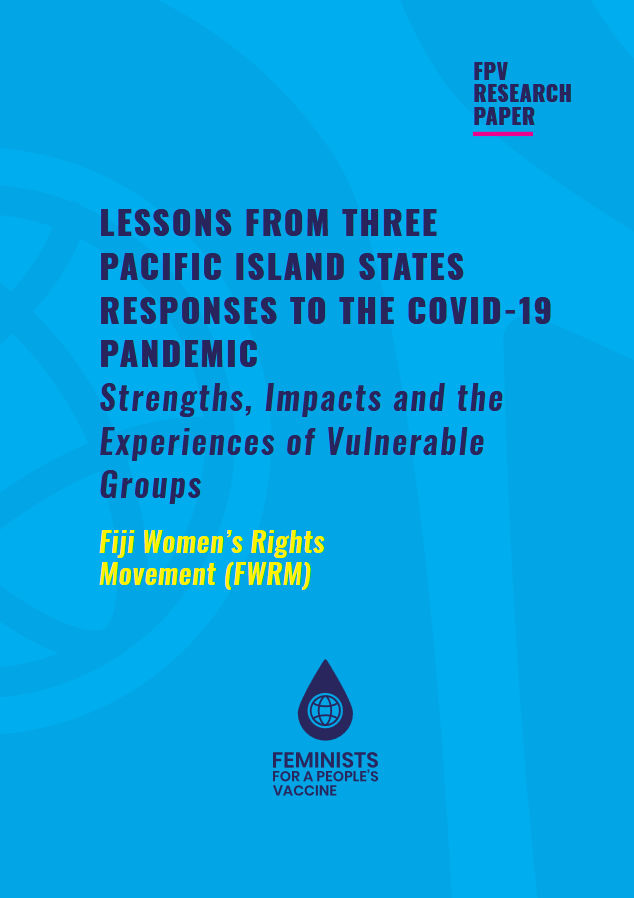
Lessons from three Pacific Island States responses to the COVID-19 Pandemic
Strengths, Impacts and the Experiences of Vulnerable Groups
-
Download PDF
- EN
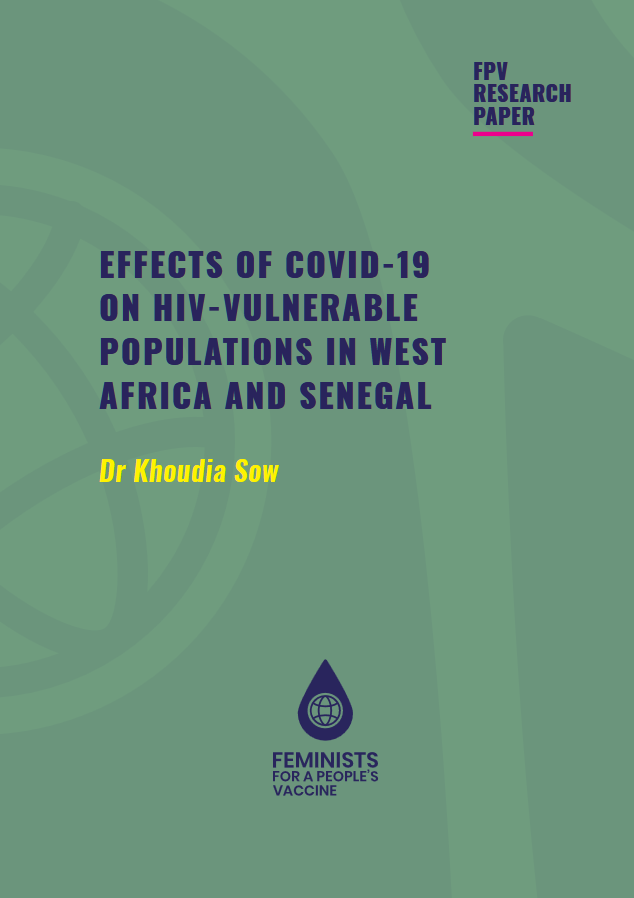
Effects of COVID-19 on HIV-Vulnerable populations in west Africa and Senegal
Dr Khoudia Sow
-
Download PDF
- EN
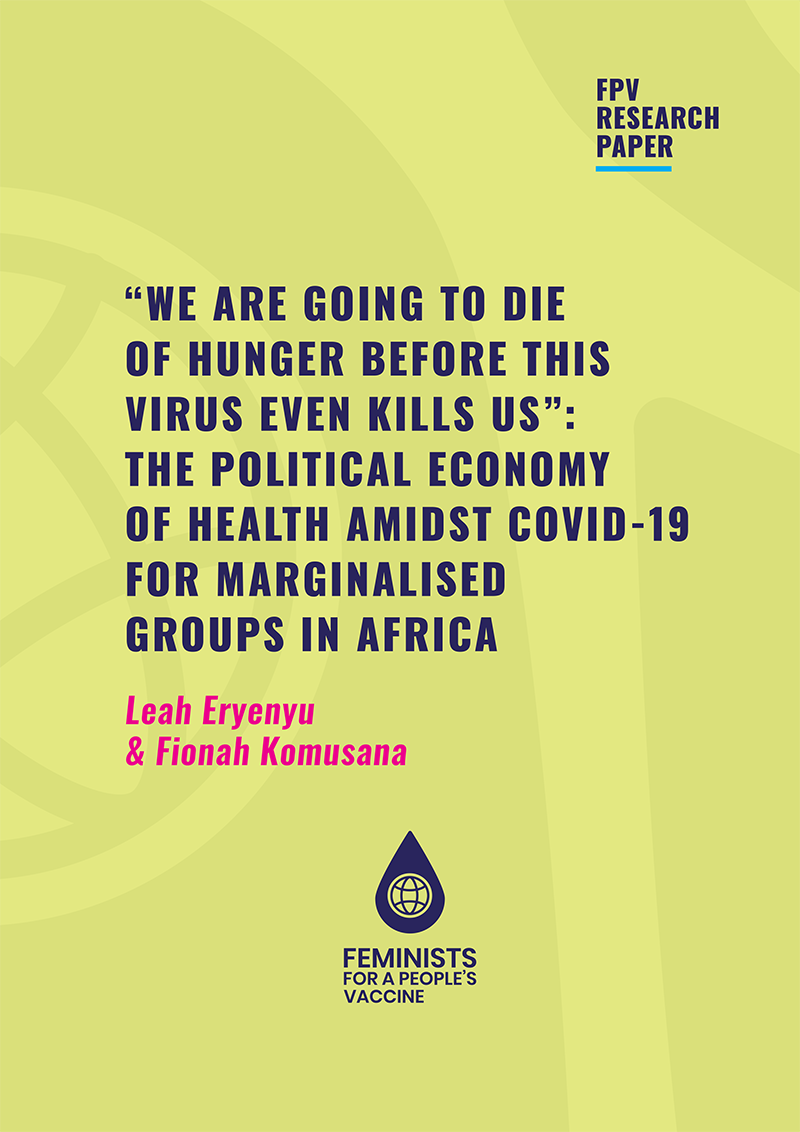
“We are going to die of hunger before this virus even kill us”
The political economy of health amidst COVID-19 for marginalised groups in Africa
-
Download PDF
- EN
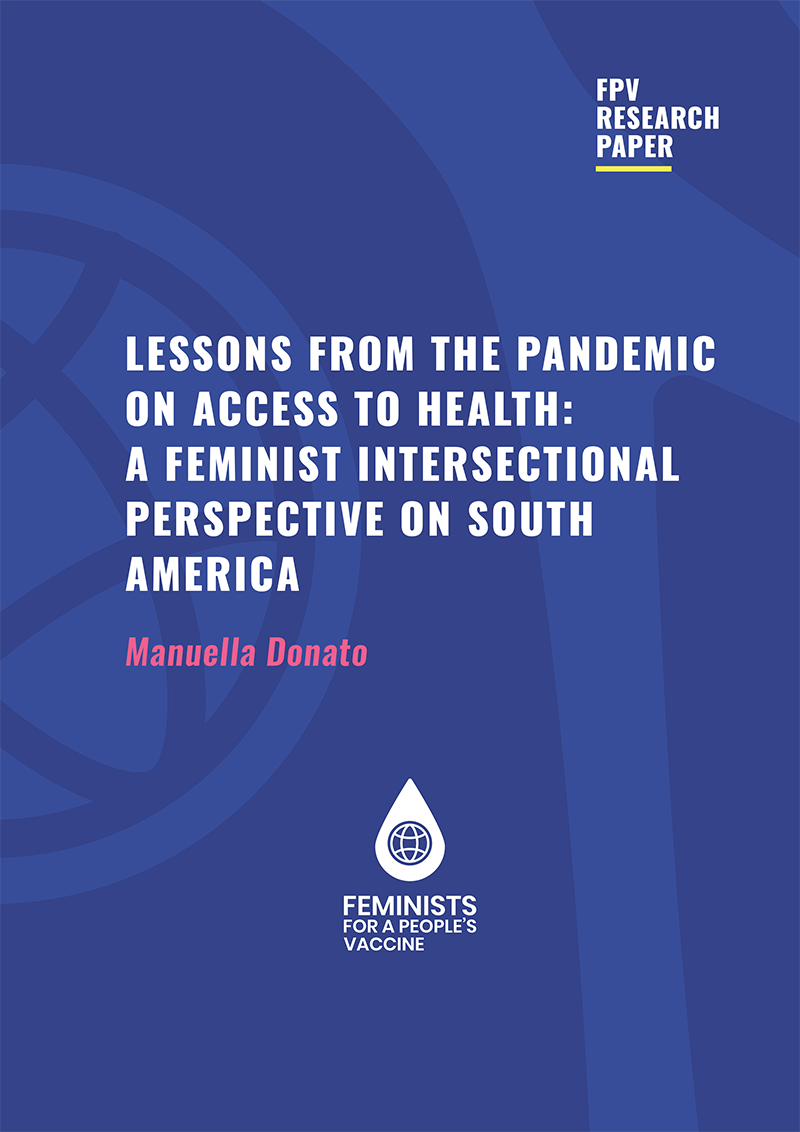
Lessons from the Pandemic on Access to Health:
A Feminist Intersectional Perspective on South America
-
Download PDF
- EN

Who gets to access healthcare?
Lessons from the pandemic on access to health in mexico and central america from a feminist intersectional perspective
-
Download PDF
- EN
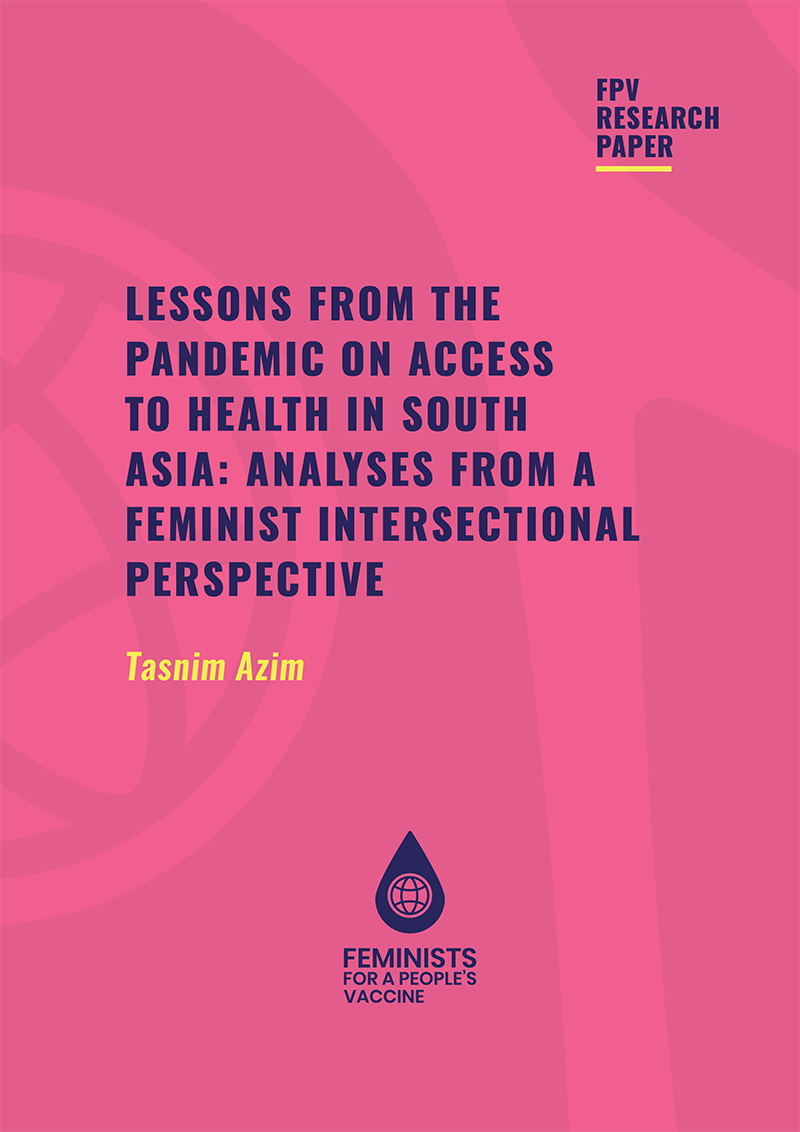
Lessons from the pandemic on access to health in South Asia
Analyses from a feminist intersectional perspective
-
Download PDF
- EN
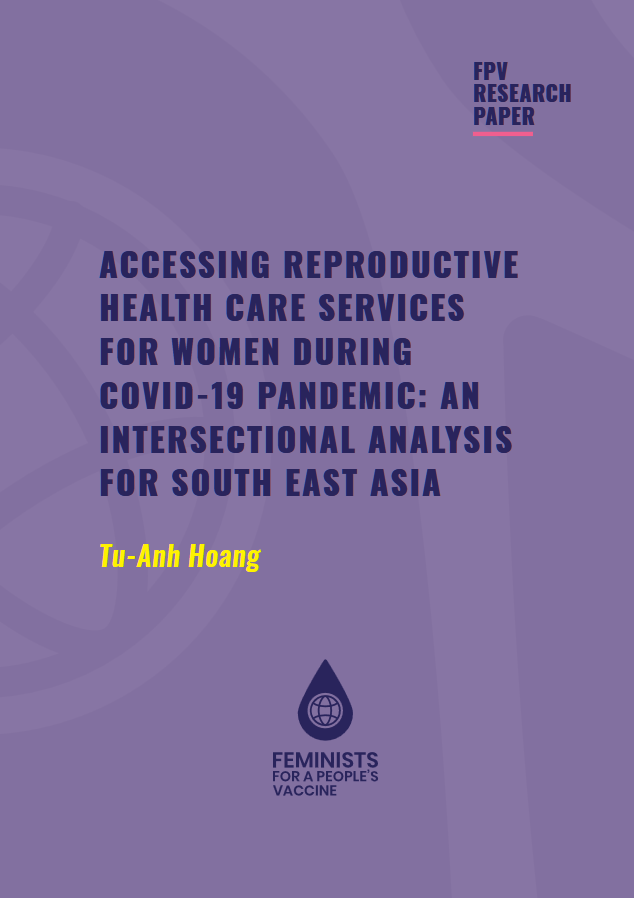
Accessing reproductive health care services for women during COVID-19 pandemic
An intersectional analysis for South East Asia
-
Download PDF
- EN
Fight for PABS in the Pandemic Agreement–Equity lies in Access and Benefit Sharing
As civil society that have been following the intergovernmental negotiating body (INB) for a Pandemic Agreement.
Prevent Pandemics by Adopting a Meaningful PABS System – Global Letter
Civil Society Letter to the INB Bureau and WHO Member States participating in the 11th meeting of theIntergovernmental Negotiating Body (IN
The UK’s Extraterritorial Obligations and the Right to Health in a Time of Polycrisis
Shadow report submitted to the 113th Session, Committee on the Elimination of Racial Discrimination.
Switzerland’s obligation to support a global public good approach to COVID-19 tools
Shadow report submitted to the 83rd CEDAW Session on how States must apply a global public good approach with equitable access to COVID-19 tools to protect women’s right to health.
Belgium’s obligation to support a global public good approach to COVID-19 tools
Shadow report submitted to the 83rd CEDAW Session on how States must apply a global public good approach with equitable access to COVID-19 tools to protect women’s right to health.
The impact of the EU’s opposition to the WTO TRIPS waiver
Shadow report submitted to the 80th CEDAW Session regarding Sweden's extraterritorial duties on women's health.
Raise
your
voice
Partners
Who we are
Become a partner
Asian-pacific Resource and Research Centre for Women

Equidad de Género. Ciudadanía, trabajo y familia a.c.

FEIM - Fundación para Estudio e Investigación de la Mujer

Gender Studies & Human Rights Documentation Centre

International Network to End Violence Against Women and Girls, chaired by Masimanyane Women's Rights International

International Women's Rights Action Watch Asia Pacific

Mentoring and Empowerment Programme for Young Women (MEMPROW)

